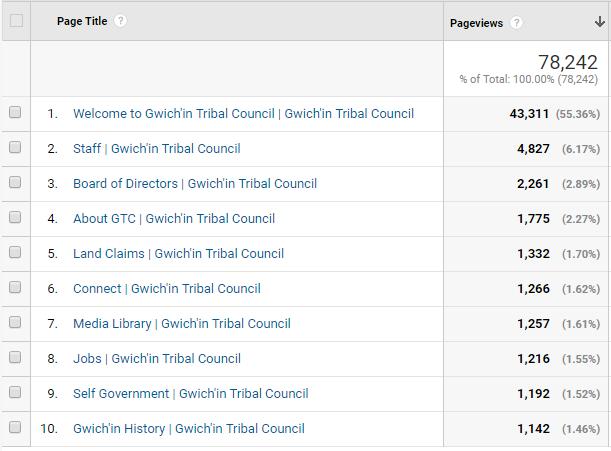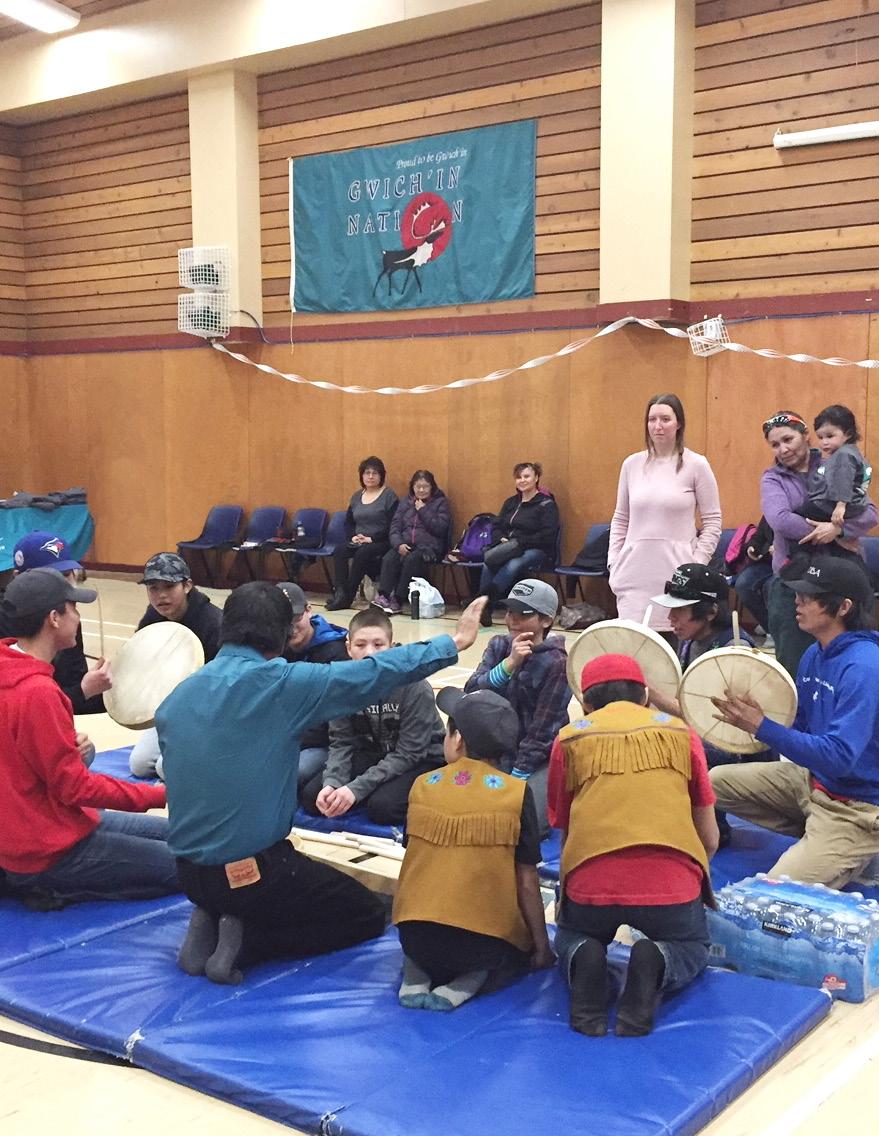




Bobbie Jo Greenland-Morgan
Drin Gwiinzii Shilakut,
We are now approaching the last year of our four year term as the elected leaders of the Gwich’in Tribal Council (GTC). I am pleased to provide this opening message for the GTC annual report for 2019. I have always been honoured to hold this position and represent the Gwich’in, I am grateful for the opportunity and I will continue to encourage good communication, team work and growth.
When I put my name forward in the 2016 election for President, I stated that I offer integrity, respect, commitment, hard work, compassion and strong ethics – these are the underpinnings of my leadership style. I also said that I would strive for unity, engage our people in decision making, work with the people to address animosity among leaders, secure funds and resources that would generate revenue and provide employment, and help our organization to grow and move us forward with continued improvements to organizational structure and policies. I believed then and continue to believe that these goals will lead us to healthier business, stronger investments and proven accountability. These beliefs and goals will continue to guide my work as President and Grand Chief in the coming year.
I am pleased to say that we are making progressIt is not as fast as most of us want to see, but the important thing is there is progress happening. This Annual Report details what has been happening in each of the departments at the Gwich’in Tribal Council over the past year; you can read the positive things that have been achieved. I would like to recognize the hard work by all staff - they are the ones who carry out a lot of the action items and direction given by the executive, board of directors and annual general assembly. Everyone on the team is part of our success in getting important work done. I thank the entire team for their contributions. Mahsi Cho.
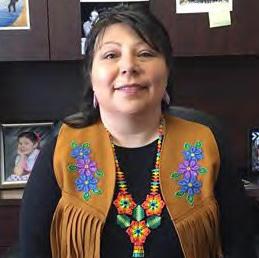
A key role of the Gwich’in Tribal Council is to implement the Gwich’in Comprehensive Land Claim Agreement (GCLCA). I continue to hear from folks who are not happy about certain aspects of the GCLCA, and frankly, there are parts of the GCLCA that I wish were stronger and provided better provisions to support our people. I’ve learned that it is better to seek new ways to leverage the GCLCA for the benefit of all Gwich’in rather than dwell on its weaknesses. I wish to encourage people to read and understand our Land Claim better and become informed on how it can make the Gwich’in Nation stronger. I welcome ideas and suggestions on how we can move forward, making the best of what we have inherited and create more opportunities for our organizations and ultimately, for our people. I remain open to communications and willing to work with everyone who wants to work with integrity and in good faith and for the future generations.
I will continue to live up to what I had first stated in my election platform. My slogan was, “Let’s Go, Let’s Grow, Let’s Vote Bobbie Jo”. When I said this, I didn’t mean for us to grow the Gwich’in Tribal Council, moreover, we would work together and help the communities grow - this is what is happening. I want to see each community develop and strengthen their capacity so that they can continue to grow and be a healthy highly functioning organization. In order to enable this, the team at GTC, on the direction and approval of the Board of Directors and the Annual General Assembly, have been able to make the changes to the by-laws and change the financial formula so that communities receive equal and increased funding. This is about building capacity at the local level, which is critical as we go down the road to
community self-governance. As a collective claim, we need to support and demonstrate equality across our communities.
As Chairperson of the Gwich’in Development Corporation (GDC), I am pleased with the performance of the Board of Directors and management; as we are all doing our job and working well together, we are also seeing continued improvement in our financial results. The last GDC board meeting was in early June 2019 and the board approved the audited Financial Statements for 2018. I am pleased that our consolidated 2018 profits were close to 1 Million dollars. The Board also got an update on GDC’s performance in the first four months of 2019 and discussed the GDC’s sustainable growth strategy. I am pleased with the work of this board and how they have brought GDC through some tough times and now GDC is at a healthier place, where we can now focus on continued growth.
Another thing I stated in my election platform was the unity of our people – I continue to believe strongly that unity is necessary to ensure we leverage our Land Claim to the fullest for the benefit of all Participants. Unity to me is about a people sharing a vision and working together to achieve such vision and goals in the best interest of the people they are working for. Unity is happening in some areas, but not in all. I will continue to promote and encourage unity, and hope that others will do their part and make it a reality in all areas. Our people tell me they want to see healthy changes - in order to enable change, people need to be open to and accept change and walk with it together. Positive change and our ability to embrace it go hand in hand; that is why healing is so important, as healing brings the balance we all need to adapt to change.
Our people are on the road to healing and it is through the holistic healing of spiritual, mental, physical and emotional that we will find balance and become a healthier people and thus revitalizing our spirituality, culture and language. We will one day be self governing and move away from the current systems and be operating in a system that is based on Gwich’in fundamentals. That continues to
be my vision for our future. A healthy people first, a strong Gwich’in Government second. I have hope in our youth and that they will play a key role in making this happen.
I am grateful for my parents and how they raised me to work for what I wanted in life and not to depend on anyone or expect anything to be done for me. They taught me to be accountable and take responsibility for my own actions, including the consequences of my own choices. They taught me to be honest and speak the truth. They taught me to be compassionate and forgiving. Such teachings have helped me a great deal in my first three years in office and allowed me to help others too. We need to encourage our children and youth to take control of their futures and to use the Land Claim as a tool to assist in their advancement. Life is full of success and failure, we need to all take responsibility for our own lives, our own successes and our own failures; all while encouraging and empowering each other.
I will continue to work with Vice President Jordan, the Board of Directors and all other leaders and staff to see we are implementing the land claim agreement and holding the Territorial and Federal Government to their obligations as signatories to this comprehensive land claim agreement. We will ensure that we are meeting our obligations also.
Mahsi Cho to each and every one who has provided constructive criticism and advice over the years. I especially thank my parents Freddie and Bella, my husband Wyatt and daughter Elisha for their support and the sacrifice of so much family time. And to the many Elders in the region who continue to offer prayers for their leadership and all the people; they give from their heart with positive advice and encouragement. I thank them all from my heart.
Adik’anootih (take care of yourselves), and K’egwaadhat nakhwah vili’ (God bless you all).
Sincerely,

Bobbie Jo Greenland-Morgan Grand Chief/President
Jordan Peterson
Drin Gwiinzii,
The past year has been a successful and progressive one for GTC and our community Designated Gwich’in Organizations. We’ve continued to collaborate and ensure we work together to advance the interests of Gwich’in, specifically the GTC put forward bylaw revisions at the 2018 GTC Annual General Assembly that increased DGO core funding to an equal based model for each DGO. The commitment to help support and build capacity at the community level is a top priority.
GTC was given direction from the 2018 GTC AGA to also begin negotiating Self-Government on a community based and collaborative manner. The Tetlit, Gwichya and Ehdiitat have agreed to continue negotiations with GTC as an equal partner which ensures that each party has an equal interest and say in the process moving forward. We’ve begun a new approach and model since given the direction in 2018 which would be a governance model of Self-Government. Reasons for this model are to ensure that Gwich’in have Self-Government established which focuses on setting up the government and increased funding. This process will allow Gwich’in to be able to focus on setting up and establishing the community governments and to begin negotiations for the programs and services our people want when ready.
GTC continues to explore options to deal with the implementation concerns we’ve had for almost the entire life of the Gwich’in Comprehensive Land Claim Agreement. As reported in my 2017-2018 annual report we have now entered into our 6th year to year renewal of the 2003-2013 Implementation Plan. Our team is close to finalizing and we are hoping to do so within the 2019-2020 fiscal.
Yukon Transboundary has always been and continues to be a major priority for the GTC
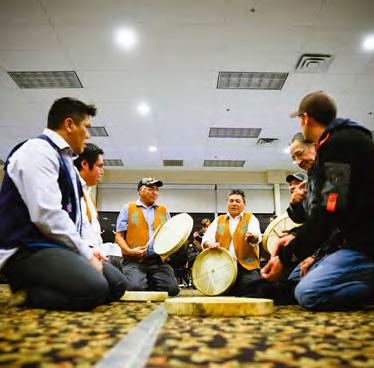
and for our communities. Our team was able to continue to bring in transboundary funding and although still drastically underfunded it continues to be positive steps towards increased funding to implement the land claim but to also protect and promote the rights of Gwich’in in the Yukon.
The GTC team has been doing an amazing job on the language initiatives we currently have and are all working together to educate government and to also promote that funding needs to come directly to Gwich’in to have full control over how we’d like to pursue language revitalization. The biggest barriers around any program is the framework that your proposal must meet, having the authority and direct funding relationship is key to progress for our people. This is why I believe Self-Government is a must for our Nation!
Overall GTC has had a very progressive year with much more external funding coming in to provide programs for our people. We’ve established new collaborative ways to support our communities within Self-Government such as lobbying the federal government for increased funding to pay for community Self-Government advisors and have been successful, please keep an eye out for this amazing opportunity in one of our communities. We continue to meet the biggest challenges head on, such as decreased resource royalty dollars with a positive outlook and a solutions-based approach and I am proud of our team that always rises to the occasion when met with such big issues.
I’d like to personally thank all of those that fought for the last 15 years for the protection of the Peel Watershed, those that sat on the commission, worked for GTC, elected leadership and the
many Gwich’in that marched the streets of our communities, Whitehorse and sat through the three court cases and ensured our voices were heard all the way to Ottawa. With the signing of the Peel Land Use Plan and 83% protection, the mandate given to each of us from our elders has been achieved.
When our people are united around issues, we can achieve great things such as the protection of the peel watershed or the revival of our culture, language and spirituality. It is when we are met with the toughest of tests the characters of our people shine through and that is what it means to be “proud to be Gwich’in”.

Jordan Peterson Deputy Grand Chief/Vice President
This report is submitted on behalf of the Gwich’in Tribal Council (GTC) Board of Directors (BODs) for the period of April 2018 to March 2019. The BODs held quarterly meetings at which time a number of matters were discussed and direction was given to GTC staff. Each Gwich’in Council also had an opportunity to provide their quarterly reports.
Quarterly meeting agenda items comprise of standard reports of Financial Statements, Executive, Committee, Department, Affiliate and Gwich’in Councils.
The following lists the accomplishments and matters dealt with by the GTC BODs for this reporting period:
July 2018, GTC Main Boardroom, Inuvik
Executive: Bobbie Jo Greenland-Morgan, Jordan Peterson
Tetlit Gwich’in Council: Leslie P. Blake, Douglas Wilson Sr.
Gwichya Gwich’in Council: Grace Blake, Anna May MacLeod
Ehdiitat Gwich’in Council: Andrew Charlie, Regrets: Gladys Edwards
Nihtat Gwich’in Council: Eliza Firth, Barry Greenland
Gwich’in Participants: None
v Review and approve quarterly financial reports
› 31 March 2018 Preliminary results
› 2018-2019 Proposed Budget
v Intergovernmental Matters
› GTC Intergovernmental Relations Protocol
› Yukon Government “Skirmishes”
• Communication protocol (draft)
• Peel Letter of Understanding (draft)
• Harvesters Brochure
• Vuntut Gwitchin Land Exchange
• Chance Oil & Gas
• Yukon Parks Strategy
• NND Transboundary
› Self-Government
• Facilitated Session report
• Opinion Research
› Implementation Plan (draft)
• Consultation
• Broadening the Conception of Treaty Implementation “Nation Building”
› Federal Government Leadership Engagement
• Treaty Loan Payment Reimbursement
• Letters & submission to Minister Bennett
v Financial Statements
› Gwich’in Children’s Trust
› Gwich’in Harvesters Assistance Trust
v Special Assembly
› Reschedule date
v Annual General Assembly
› Set date, Aklavik
› Chairperson
› 2017 Resolutions
v Mackenzie Valley Construction
› NGC Lease
v Updated GTC Bylaw #1 and #2
v Tetlit Gwich’in Council Appoint to GSC
v Gwich’in Internship Project
v GCLCA Enrollment
v GTC Co Management Board nominations
August 2018, Chief Joe Bernard Learning Center, Tsiigehtchic
Executive: Bobbie Jo Greenland-Morgan, Jordan Peterson
Tetlit Gwich’in Council: Leslie P. Blake, Douglas Wilson Sr.
Gwichya Gwich’in Council: Grace Blake, Anna May MacLeod
Ehdiitat Gwich’in Council: Andrew Charlie, Regrets: Gladys Edwards
Nihtat Gwich’in Council: Eliza Firth, Barry Greenland
Gwich’in Participants: 6
v Land Lease
v AGA Details
v Self-Government
v Gwich’in Council International
v Clarification of Confict of Interest
v Financial Statements
› Review of Non-consolidated Financial Statements
› Review of Consolidated Financial Statements
› Audit Findings Report
v Assemblies: Special and Annual
› Agenda
› Chairpersons
› 2017 Resolutions
v GTC Bylaw #1 and 2 amendments
v Gwich’in Harvesters Assistance Trust Trustees
v MOU Economic Development
v Indigenous People Nation Rebuilding Proposal support
v Land Lease Agreements
v GCLCA Enrollment
Octobert 2018, Chief Jim Koe Zheh, Inuvik
Executive: Bobbie Jo Greenland-Morgan, Regrets: Jordan Peterson
Tetlit Gwich’in Council: Leslie P. Blake, Douglas
Wilson Sr.
Gwichya Gwich’in Council: Grace Blake, Mavis
Clark
Ehdiitat Gwich’in Council: Andrew Charlie, Regrets Gladys Edwards
Nihtat Gwich’in Council: Eliza Firth, Regrets:
Barry Greenland
Gwich’in Participants: 1
v Swearing in of Director Mavis Clark
v Bylaw & Policies
› Education
› Gwich’in Business
› Communications
› Records Management
v Appoint GHAT Trustees
v Conflict of Interest
v Dene Cultural Institute
v Christmas Office Closure – Dec 21-Jan 1st
v Education funding wait list
v Archive Photo Collection
v Assemblies suggested changes
v DGO audited financial statements
v Time requirement
v GCLCA Enrollment
v Board Appointments
v Executive Performance Reviews
January 2019, Chief Jim Koe Zheh, Inuvik
Executive: Bobbie Jo Greenland-Morgan, Jordan Peterson
Tetlit Gwich’in Council: Leslie P. Blake, Douglas Wilson Sr.
Gwichya Gwich’in Council: Grace Blake, Mavis
Clark
Ehdiitat Gwich’in Council: Andrew Charlie, Gladys Edwards
Nihtat Gwich’in Council: Eliza Firth, Barry Greenland
Gwich’in Participants: 1
v Gwich’in Development Corporation
› Board Appointment
› Remuneration (Honoraria) review
v Appoint GHAT Trustees
v Gwich’in Council International Service Agreement
v Surplus funds
v Children’s Trust
› Investment
v Unallocated net earnings
v Programs & Services (Non-Gwich’in Participants)
v Christmas Office Closure
v Communications
v BODs Operating Business
v Gwich’in 101 curriculum
v GNWT-GTC Economic Development MOU
v Assemblies suggested changes
v DGO audited financial statements
› Time requirement
v Land Lease – W Simon
v AGA – Set date
v Nation Building Proposal
v Treaty Modernization MOU
v Self-Government
v Implementation Committee
v GCLCA Enrollment
v Board Appointments
v Executive Performance Reviews
February 2019, Chief Jim Koe Zheh, Inuvik
Executive: Bobbie Jo Greenland-Morgan, Jordan Peterson
Tetlit Gwich’in Council: Leslie P. Blake, Excused: Douglas Wilson Sr.
Gwichya Gwich’in Council: Mavis Clark
Ehdiitat Gwich’in Council: Andrew Charlie, Gladys Edwards
Nihtat Gwich’in Council: Excused: Eliza Firth, Barry Greenland
Gwich’in Participants: None
February 2019, Chief Jim Koe Zheh, Inuvik
Executive: Bobbie Jo Greenland-Morgan, Jordan Peterson
Tetlit Gwich’in Council: Leslie P. Blake, Excused: Douglas Wilson Sr.
Gwichya Gwich’in Council: Mavis Clark
Ehdiitat Gwich’in Council: Andrew Charlie, Gladys Edwards
Nihtat Gwich’in Council: Excused: Eliza Firth, Barry Greenland
Gwich’in Participants: None
March 2019, Chief Jim Koe Zheh, Inuvik
Executive: Bobbie Jo Greenland-Morgan, Jordan Peterson
Tetlit Gwich’in Council: Leslie P. Blake, Douglas Wilson Sr.
Gwichya Gwich’in Council: Julie Ann Andre, Mavis Clark
Ehdiitat Gwich’in Council: Regrets: Andrew Charlie, Gladys Edwards
Nihtat Gwich’in Council: Eliza Firth, Barry Greenland
Gwich’in Participants: None
v Swearing in of Director Julie Ann Andre v 2019/2020 draft Budget
GTC Board of Directors for this time period:
Gladys Edwards, Ehdiitat Gwich’in Council
Andrew Charlie, Ehdiitat Gwich’in Council
Leslie P. Blake, Tetlit Gwich’in Council
Douglas Wilson Sr., Tetlit Gwich’in Council
Eliza Firth, Nihtat Gwich’in Council
Barry Greenland, Nihtat Gwich’in Council
Grace Blake, Gwichya Gwich’in Council, Resiged February 2019
Mavis Clark, Gwichya Gwich’in Council
Julie Ann Andre, Gwichya Gwich’in Council, Appointed March 2019
Vanh Gwinzii/Drin Gwinzii,
Carolyn Lennie vilzhii, Tsiigehtchic gwats’at ihłlii. Inuvik danh gwihch’in. I am the Chief Operating Officer for the Gwich’in Tribal Council.
The Gwich’in Tribal Council (GTC) is involved in many initiatives in all effort to implement the Gwich’in Comprehensive Land Claim Agreement (GCLCA) and I am pleased to work on behalf of all Gwich’in with the Executive, Board of Directors, and a great team of employees at the forefront of the work.
My annual report submission will cover the period of April 1, 2018 to March 31, 2019 highlighting the operational perspective.
Throughout the past year, our team, GTC wide, have conducted a lot of research, reviews, strategizing, sound decision making, balancing revenues and expenses, improving processes, and adjusted to changes in operations to meet the direction set by the GTC Board of Directors. The following highlights our accomplishments:
Gwich’in (Wellness)
With approved external funding, GTC was able to make the necessary changes to lighting, installation of wood stove, assess the generators and water plant and other initiatives in making the Gwich’in Camp energy efficient.
Through external funding GTC was able to conduct a Gwich’in Cultural Tourism Feasibility Study, the study will be presented to the GTC Board of Directors for direction.
It is our goal in 2019/2020 fiscal year to secure external funding to complete the upgrades, develop a program plan and begin seeking external funding to once again offer programming at the Gwich’in camp.
With the recruiting of a new Director of Human Resources we were able to carry out the decision of the GTC Board of Directors approval of the 2018/2019 budget with budget cuts that impacted staffing. Human Resources provided the necessary supports to adjust to the impacts and ensure that staff continue in their capacities. Human Resources also reviewed appropriate systems to replace the GTC manual systems with an electronic based system which would be more effecient in personnel record keeping.
Through funding GTC continued the MentorApprentice program support at least four paired groups, this program is very successful. The two individuals converse together to increase proficiency in the language.
GTC hired a part-time Digital Archivist to scan all original documents that were stored in the Gwich’in Langauge Center, once the digitizing is completed the goal is to have the information accessible to the Gwich’in and the public.
This year the Gwich’in Lanague Specialist was able to secure funding to conduct on the land immersion camps in Tsiigehtchic and Fort McPherson. The specialist also worked with Gwich’in elders in resource development and translation services.
In the fall of 2018, through secured funding the Gwich’in Langauge Specialist organized a Gwich’in Lanague Gathering in Fort McPherson. The gathering was very successful and positive feedback was given.
GTC continues to support the four Designated Gwich’in Organization with funding to support their Gwich’in Language programs and the Gwich’in Language Specialist continues to meet and support the Language Coordinators.
Throughout the year, GTC has advocated with Government for direct funding for the Gwich’in Language. In order to have long term planning for Gwich’in Language it is important to secure multiyear direct funding instead of year to year programming.
Throughout the year, various policies have been updated and presented to the Board of Directors for review. The Board of Directors established a Policy and Bylaw Committee to review and recommend policy and terms of reference changes to the Board. GTC is now completed the review of all policies.
The 2018 AGA supported the continued operations of the Yellowknife Office. In March we renewed our lease for an open space office. We were able to establish a docking station with a computer and internet access for Gwich’in Participant use in job opportunities and educational pursuits.
Each year the Annual General Assembly (AGA) passes a number of Resolutions as direction to GTC, each department is tasked with implementing the direction and provides regular updates to the Executive and Board of Directors with a final report to the next AGA.
The 2018 AGA Resolutions pertained to:
• 5 year Fiscal Strategy
• Bylaw Amendments
• Seek funding for Gwich’in Interpreter/ Translator training
• Gwich’in Hunting Protocol
• Indian Act Bands Attendance at AGAs
• Aklavik 700 Lands
• Yellowknife Office
• Protection of Porcupine Caribou Herd and Arctic National Wildlife Refuge
• Regional Renewable Resources Council Coordinator
The in-house legal counsel position continues to show benefit to GTC, the workload is consistent and significant results have been made on many files while acting as a liaison with external legal counsel. GTC has been able to clarify Designated Gwich’in Organizations authority to negotiate SelfGovernment, Articles of Continuation and Bylaw review, restructuring of operations, continuing to participate and review Governmental of the Northwest Terrorizes legislation and meeting various consultation request.
GTC has been careful to ensure that expenses are in line with budget and that we seek additional revenue to offset program and service costs. GTC continues to involve departments and staff in the budget preparation process.
In March 2018, the Board of Directors conducted a two day budget meeting reviewing the proposed 2018/2019 budget and providing direction to GTC that it is a requirement going forward to present a break even budget. The BODs had an opportunity to review line by line and provide feedback for the staff to revise and present a new budget in July 2018. Approval of the budget resulted in elimination of positions within GTC, reduced spending in departments, removal of professional devleopment and donations for this fiscal year and direction to seek external funding to offset programs.
The majority of GTC’s programs and services are based on proposal driven funding that GTC administers on behalf of the federal or territorial governments. Many opportunities are partner oriented to achieve the program results.
Through GTC Bylaw #2 Financial Administration amendments to funding allocations of Designated Gwich’in Organizations (DGOs) and GTC changed to DGOs receiving 55% and GTC receiviing 45%. This change further impacts GTC budget reductions; however the DGOs now have succificient equal funding to support their operations, staffing and governance.
The Lands Department consists of a Director, Transboundary Specialist, a Lands & Resource Specialist and an intern.
The department deals with all matters of private land access/permits, quarry permitting, harvesting rights, consultation requests, and other land related matters in the Gwich’in Settlement Area and Tetlit Gwich’in Primary and Secondary Use Areas in the Yukon.
The lands department was able to move the Porcupine Caribou Native User Agreement (NUA) and Peel Watershed Plan forward to finalization and signing in the new fiscal year. These to accomplishments are a milestone for the parties. The NUA would only come into effect when the Porcupine Caribou population is in decline. The finalization of the Peel Watershed Plan is a result of the Supreme Court ruling.
GTC continues to work with the parties to the land claim, Federal Government and the Government of the Northwest Territories, on renewal of the 10 year Implementation plan. The Senior Implementation Advisor and external legal counsel have work diligently to review all activity sheets in the plan and conduct consulations on the plan. Once all parties conduct consulation, the parties will seek approval of the plan and begin negotiating the financial agreement at which time GTC will advocate for increased land claim implementation funding.
GTC established the Treaty Modernization table to review the Cede, Release and Surrender clauses in the land claim, Co-management board appointment, periodic review and fiscal relations. GTC continues to advocate for increase implementation funding. For the second year, GTC recieved transboundary funding for the many matters we deal with in the NWT and Yukon.
GTC continues to work with the four Designated Gwich’in Organization (DGO) with capacity building and governance support. With external
funding, GTC was able to host training session in proposal writing, records management and goverance. GTC was successful to secure funding under the Nation Rebuilding fund, the funds will be utilized to support capacity building within the DGOs staff and governance.
With the 2018 Special Assembly approval of community based Self-Government negotiations, GTC and the DGOs of Gwichya Gwich’in, Edhiitat Gwich’in and Tetlit Gwich’in continue to pursue negotiations and Nihtat Gwich’in have established a separate negotiation process with the GNWT and Canada.
Gwich’in Services is responsible for providing services to Gwich’in Participants in the areas of Education & Training, Wellness and Economic Development. GTC continues to access external funding to support programs and services available to Gwich’in Participants. We receive many concerns on funding levels and programs; however, with the new Indigenous Training and Essential Skills funding agreement we were able to expand the funding eligibility to all Gwich’in regardless of residency. The funding allocation was not increased but will will ensure as many Gwich’in Participants pursuing Education and Training opportuniites are supported.
The Skills Partnership Funded the Taii Triigwatsii program in Aklavik and Inuvik. The 8 month program has been well received in the communities and has shown great successes. The program is geared towards Gwich’in Participants, incorporating the Gwich’in Culture and Academics, lifeskills and student supports.
Through the Wellness division, the Residential Health Support Worker and the four community Cultural Support Workers continue to provide support to residential school survivors and intergenerational impacts. GTC also hosted the Indian Residential School training for all workers in the field. Other wellness programming included on the land funding supports to families to teach their family members on the land living and harvesting traditional food and funds were provided for community hunts.
Within the Economic Development division, the Economic Development Specialist is available to assist Gwich’in Participants with business opportunities and business supports. The Specialist was able to secure funding to conduct a mineral strategy and a Gwich’in Camp feasiblity study.
With the budget reductions, the department has had to adjust to changes in reporting; however GTC has tried its best not to impact services to Gwich’in.
Cultural Heritage Department was able to complete the tranisition of Gwich’in Social and Cultural Institute files to the NWT Archives as directed by the GTC Board of Directors.
Research of the Porcupine Caribou herd data collection assisted the Intergovernmental Department with the State of Alaska’s Department of Interiors Environmental Impact Statement submission.
The department continues with various ongoing projects and seeks to establish and maintain the many partnerships to enhance Gwich’in resources.
Corporate Services is the department that oversees all aspects of GTC operations for our Inuvik, Fort McPherson, and Yellowknife offices including facility leases, operations costs of each location, approximately 30 employees throughout the organization, Information Technology (IT), Enrollment, database management, policy adherence, office administration and support and communications.
With the budget reductions, the department has had to endure changes in reporting and reassigning responsibilities; however we tried to minimize the impacts to operations.
The Finance Department continues to ensure accurate and timely financial information is available for management and reporting requirements. Because GTC offers a lot of programs and services through contribution agreements, the finance department plays a key role in recording all the transactions and advising Departments of spending and reporting deadlines.
In closing, this is a snapshot of what the GTC team has been involved in for the past year, each department will provide more information on their respective initiatives in 2018/2019. GTC Board of Directors, Executive and staff continue to work diligently to maximize Gwich’in interests in all areas of the GTC organization. We’ve tried our best to incorporate the feedback and changes needed to use the funding adequately, change policy where needed, communicate Gwich’in interests, establishing fair processes while valuing our employees, Gwich’in Participants, DGOs and Gwich’in Businesses. With budget reductions changes were incorporated for long term sustainability.
Mahsi Choo. K’egwaadhat nakhwah vili’.
Carolyn Lennie Chief Operating Officer
Year ended March 31, 2019
Our Mandate
Gwich’in Tribal Council (“GTC”) is committed to the economic, social and cultural development of its membership. We manage the resources received through the Gwich’in Comprehensive Land Claim Agreement and we deliver programs and services for the benefit of all Gwich’in participants.
Accumulated surplus increased by $4,903,074 from $142,054,167 in 2018 to $146,957,241 in 2019, or +3.45%, primarily due to government operations of $1.6 million and an increase in performance in the Gwich’in Settlement Corporation’s portfolio of $3.0 million.
$147,000,000
$146,000,000
$145,000,000
$144,000,000
$143,000,000
$142,000,000
$141,000,000
$140,000,000
$139,000,000
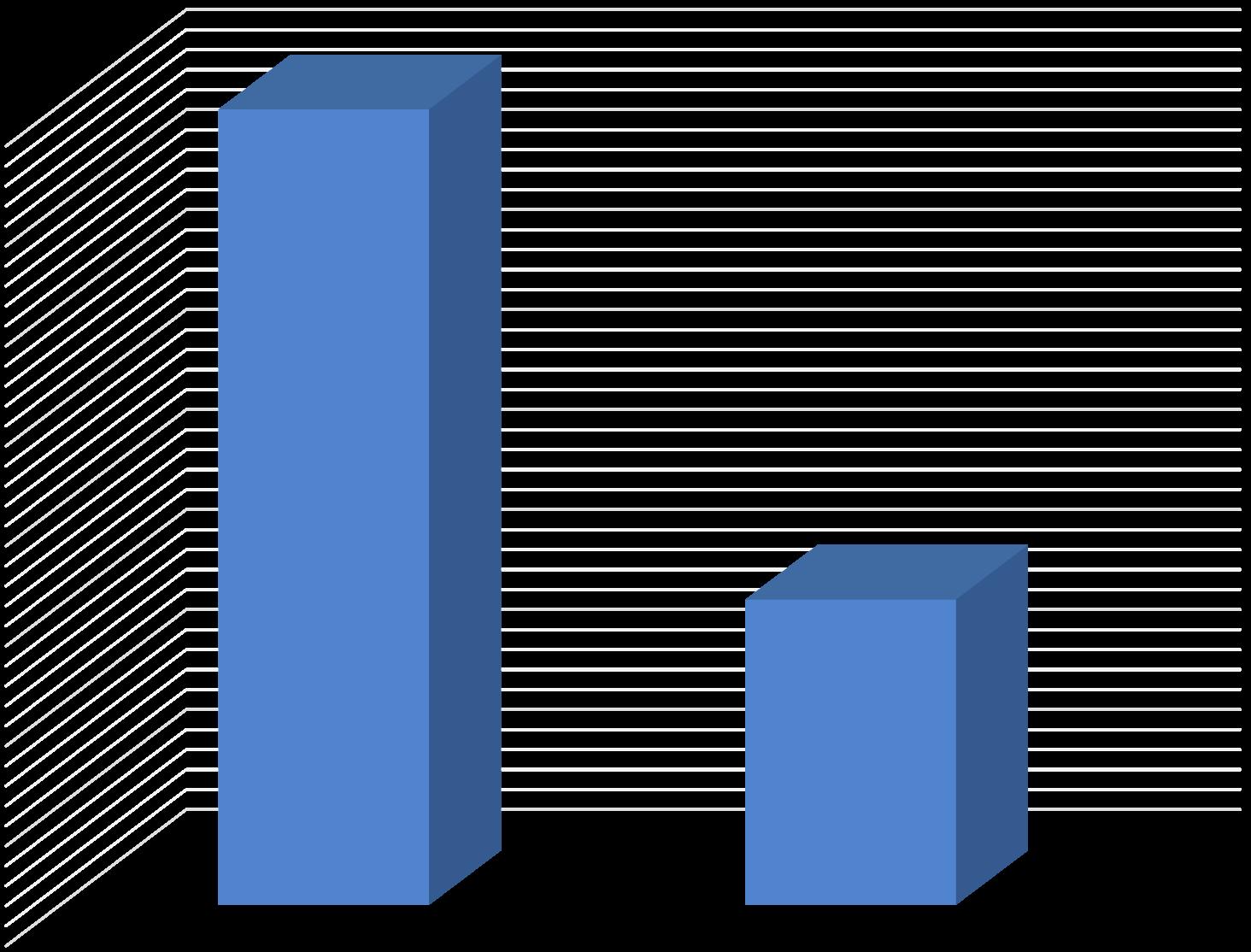
Non-financial assets of $2,350,835 in 2019 ($2,987,100 in 2018) are comprised primarily of tangible capital assets, the most significant of which are municipal lands held in Inuvik valued at $1,462,000 and the net carrying value of the Gwich’in Wellness Camp after amortization of $652,990 in 2019 ($1,305,980 in 2018).
$2,000,000 , 1%
$22,069,818 , 15% $9,553,556 , 6%
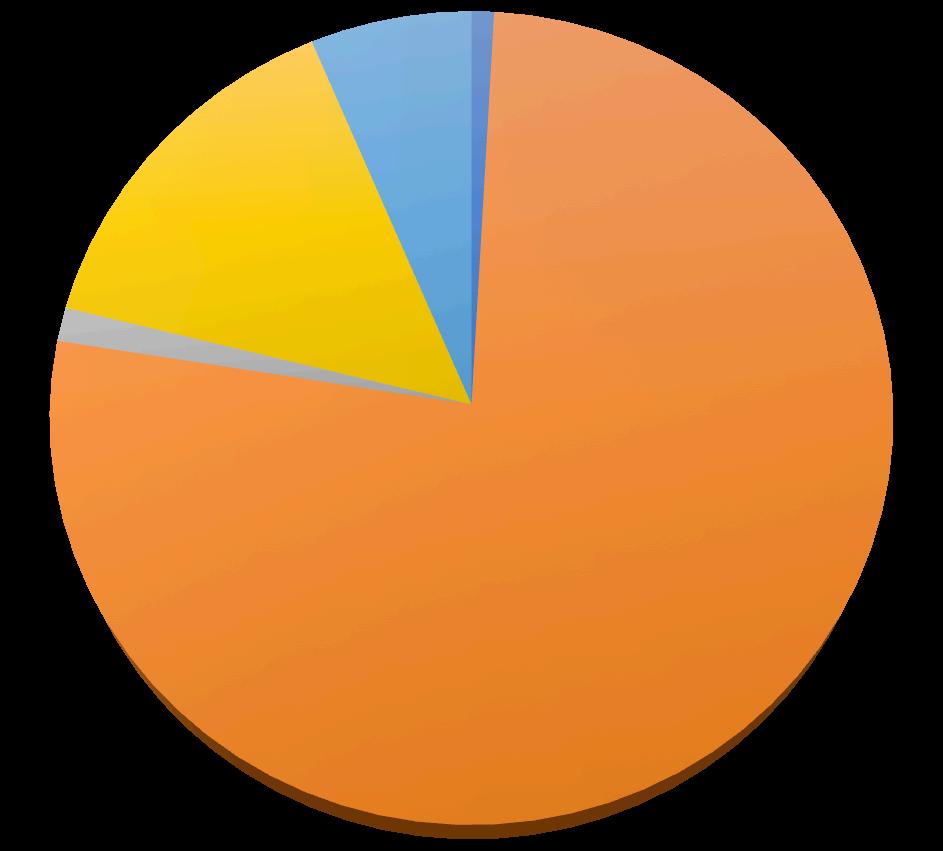
$1,327,560 , 1%
Accounts receivable ($1.3 million)
PorEolio investments ($114.6 million)
Investments in First NaIons Bank ($2 million)
Investments in business enterprises($22.1 million)
Cash & cash equivalents ($9.5 million)
$114,617,187 , 77%
The Investments in business enterprises are primarily related to our wholly owned subsidiary, Gwich’in Development Corporation (“GDC”). Overall GDC earned a profit in 2018 of $943,987 ($471,415 in 2017).
In addition, GDC has had consecutive year-over-year reductions in General and Administrative costs by $85,572 from $1,000,203 in 2017 to $914,631 in 2018, and by $216,945 from $1,217,148 in 2016.
Overall, GTC’s cash position increased by $2,692,693 in 2019 compared to a decrease of $1,240,045 in 2018. The primary reason of the increase in cash position was due to loan repayments totalling $3,273,050 made in 2018 Cash provided by operations in 2019 was $2,859,507 compared to $5,841,918 for 2018. Approximately $3 5 million was reinvested in investments in 2018, compared to $240k in 2019.
$6,000,000
$4,000,000
$2,000,000
$-
-$2,000,000
-$4,000,000
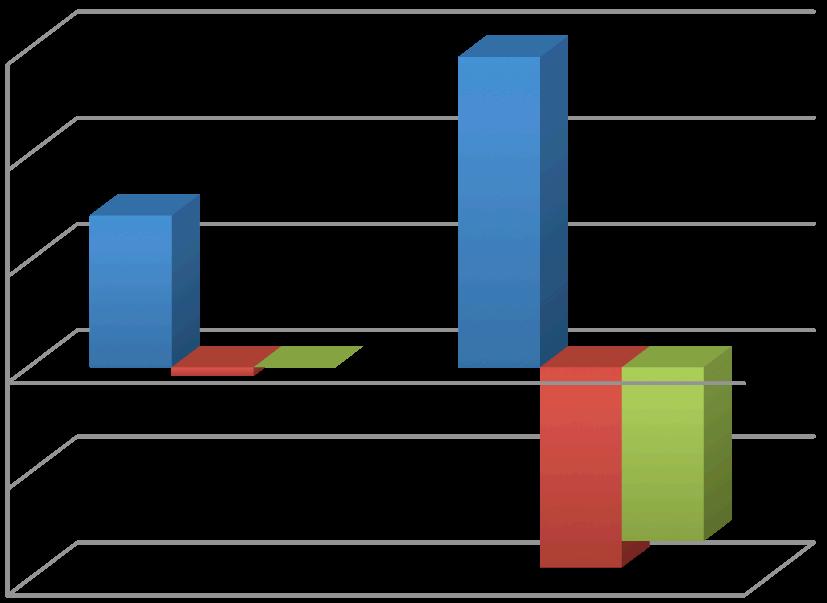
Cash Flow from OperaIons
Cash Flow from InvesIng
(Repayments of) Proceeds from loans payable
PorEolio investments (fair value) 2019
$50,000,000
$40,000,000
$30,000,000
$20,000,000
$10,000,000
$-

$5,263,421
The portfolio investments are represented by pooled funds quoted and traded in active markets. Overall our portfolio investments value increased by 2.65% from $111,662,456 in 2018 to $114,617,187 in 2019 after investment management fees, administration and operational costs and distributions made to GTC and Designated Gwich’in Organizations (“DGO”). Details of the plan structure and performance are as follows:
Accounts payable and accrued liabilites Government transfers repayable Deferred revenue
Total liabilities mainly consist of deferred revenue and amounts owing as a result of Gwich’in Tribal Council’s ordinary course of business. Total liabilities increased from $3,930,030 as at March 31, 2018 to $4,970,642 as at March 31, 2019. This increase is mainly attributed to an increase in deferred revenue of $593,612 from the prior year.
The March 31, 2019 year-end financial results for GTC achieved an annual operating surplus of $2,195,432 compared to $5,703,523 in 2018; a year-over-year decrease of $3,508,091. However, most of the decrease was due to lower realized investment income earned in 2019 of $3,841,355 compared to $6,735,689 in 2018.
ANNUAL OPERATING SURPLUS
Surplus (Deficit)
$6,000,000
$5,000,000
$4,000,000
$3,000,000
$2,000,000
$1,000,000
$-

Net revenues and earnings on investments in government business enterprises totalled $18 0 million in 2019 compared to $19 3 million in 2018 as depicted in the following chart.
$15,000,000
$10,000,000
$5,000,000

Net government & other contributions increased by $1.7 million from $8.3 million in 2018 to $10.0 million as a result of new funding under Intergovernmental affairs, and increased funding in Gwich’in Services and Lands.
Approximately $830 thousand of the 2019 royalty revenues relate to royalty entitlements of the Gwich’in Tribal Council in accordance with the Gwich’in Comprehensive Land Claim Agreement; approximately $1.4 million of the 2019 royalty revenues relate to resource revenues under the Northwest Territories Intergovernmental Resource Revenue Sharing Agreement through Devolution.
The 2019 investment income of $3.8 million is net of investment management fees and made up of approximately $2.5 million from interest, dividends and pooled investment income, and $1.3 million of realized gains on portfolio investments.
Profit on investments in government business enterprises
GDC Summary of key contributors on profit
December 31, 2018
Results from operating activities ($0.6 million) Net finance costs ($0.1 million)
of profit of equity-accounted investees
million Changes in fair values of investment properties ($0.3 million) Insurance settlement: proceeds and gain on disposal $0.5 million
Total Profit $ 0.9 million
Expenses
Expenses totalled $15.7 million in 2019 compared to $13.6 million in 2018 as illustrated in the following graph. The overall increase of the $2.2 million can be attributed to increased funding to the Designated Gwich’in Organizations of $1.0 million and increase activity in externally funded programs under Intergovernmental affairs and Gwich’in Services
$4,000,000
$3,500,000
$3,000,000
$2,500,000
$2,000,000
$1,500,000
$1,000,000
$500,000
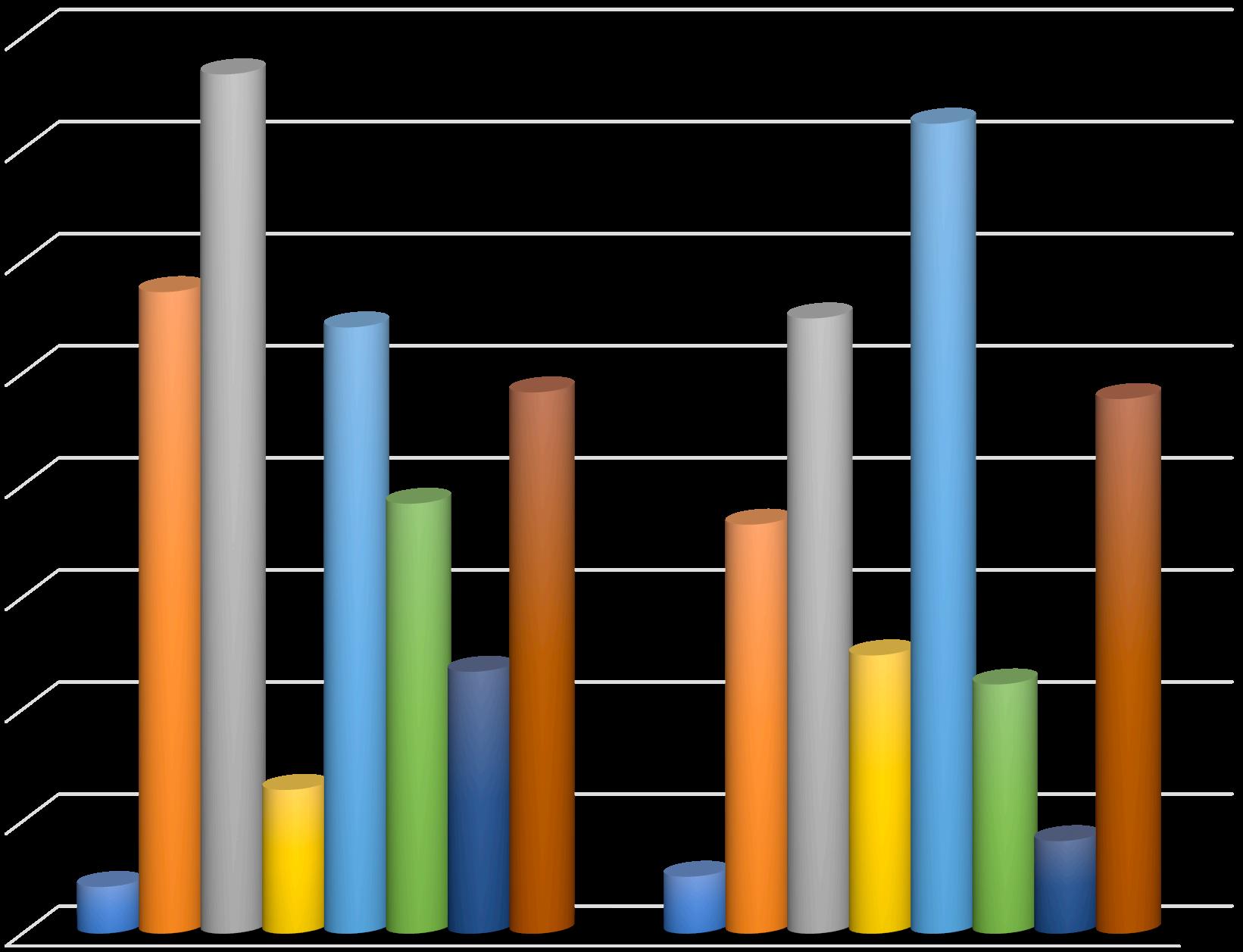
DistribuIons to ParIcipants, Elders & Harvesters ContribuIons to DGOs, RRCs, Others
Gwich'in Services
Finance & ExecuIve
Lanuage and Culture & Heritage
Intergovernmental affairs Lands Corporate Services
Own source expenses are operating costs that should be funded through external dollars but are funded by our own source revenues. Own source revenues primarily stem from the Gwich’in Comprehensive Land Claim Agreement and primarily consist of annual withdrawals from our Gwich’in Settlement Corporation of $3.0 million, resource royalties of $1.9million, gravel, user fees and other revenue of $1.0 million.
Own source expenses increased by $700k from $5.3 million in 2018 to $6.0 million in 2019. The increase is attributed to the increased funding the DGOs received through the 2018 By-Law No. 2 revisions of the financial distributions’ percentage paid from the Gwich’in Settlement Corporation. The funding the DGOs received from Gwich’in Settlement Corporation in 2019 was $1,535,095 compared to $846,510 in 2018
The Gwich’in Tribal Council has made significant improvements in reducing own source expenses. We have cumulatively reduced own source expenses by $1.4 million since 2016.
Reflecting on 2019:
2019 came with financial challenges to overcome. We had to adjust our operational spending to reflect the complete removal of the Imperial funding of $780,000 received in 2018, and a reduction of Gwich’in Settlement Corporation funding to GTC of $500,000 for DGOs core funding. However, we adjusted with following our fiscal sustainability strategy and increased our external funding by $1.7 million.
We have managed our financial risk by protecting our financial position, increasing financial capacity and decreasing dependency of own source revenues. We have come from an accumulated deficit in our general government operations of $2 million in 2016 to an accumulated unrestricted surplus of $2.8 million in 2019 These are successes to remember and achievements to build upon.
The Gwich’in Settlement Corporation has grown from $101,620,927 in 2016 to $109,353,935 in 2019. Year-over-year reductions in withdrawals from the portfolio have contributed to ensure growth of the fund for future generations.
There are still challenges to overcome. We continue to operate under significant underfunding received for implementation resulting in dependency on own source revenue to fund operations while striving to make progress and efficiencies under these constraints.
In closing:
I want to congratulate and commend the hard work and efforts of the Executives. Their diligence and heart do not go unnoticed:
• Bobbie Jo Greenland-Morgan, Grand Chief / President
• Jordan Peterson, Deputy Grand Chief / Vice President
• Carolyn Lennie, Chief Operating Officer
I would like to personally thank the hard work and the dedication of the finance staff. Their value and contribution to GTC is second to none:
• Evelyn DeBastien, Financial Controller
• Norma Blake, Assistant Controller
• Vicky Alexie, Finance Officer
• Louise Nazon, Finance Officer
I look forward to the year ahead, building upon our successes and endeavoring to implement our potential.
Mahsi’ Cho, Steven Larkin, CPA, CGA Chief Financial Officer
Consolidated Financial Statements of
Year ended March 31, 2019
The accompanying consolidated financial statements of Gwich’in Tribal Council are the responsibility of management.
The consolidated financial statements have been prepared by management in accordance with Canadian public sector accounting standards and as such include amounts that are the best estimates and judgments of management
Management is responsible for the integrity and objectivity of these statements and for implementing and maintaining a system of internal controls to provide reasonable assurance that reliable financial information is produced.
The Council is responsible for ensuring that management fulfils its responsibilities for financial reporting and internal control and is ultimately responsible for reviewing and approving the consolidated financial statements.
The Council meets periodically with management, as well as the external auditors, to discuss internal controls over the financial reporting process, auditing matters and financial reporting issues, to satisfy themselves that each party is properly discharging their responsibilities, and to review the consolidated financial statements and the external auditors’ report.
The external auditors, KPMG LLP, conduct an independent examination in accordance with Canadian auditing standards, and express their opinion on the consolidated financial statements. The external auditors have full and free access to management and meet when required. Their report to the members of Gwich’in Tribal Council, stating the scope of their examination and opinion on the consolidated financial statements, follows.
Chief Operating Officer Chief Financial Officer
Inuvik, Canada
August 13, 2019

KPMG LLP
2200, 10175 – 101 Street
Edmonton, AB T5J 0H3
KPMG LLP
Telephone (780) 429-7300
2200, 10175 – 101 Street
Fax (780) 429-7379
Edmonton, AB T5J 0H3
www.kpmg.ca
Telephone (780) 429-7300
Fax (780) 429-7379
www.kpmg.ca
To the Members of Gwich’in Tribal Council
To the Members of Gwich’in Tribal Council
Opinion
We have audited the consolidated financial statements of Gwich’in Tribal Council (the Entity), which comprise:
• The consolidated statement of financial position as at March 31, 2019
We have audited the consolidated financial statements of Gwich’in Tribal Council (the Entity), which comprise:
• the consolidated statement of operations and accumulated operating surplus for the year then ended
• The consolidated statement of financial position as at March 31, 2019
• the consolidated statement of remeasurement gains and losses for the year then ended
• the consolidated statement of operations and accumulated operating surplus for the year then ended
• the consolidated statement of changes in net financial assets for the year then ended
• the consolidated statement of remeasurement gains and losses for the year then ended
• the consolidated statement of cash flows for the year then ended
• the consolidated statement of changes in net financial assets for the year then ended
• the consolidated statement of cash flows for the year then ended
• and notes to the consolidated financial statements, including a summary of significant accounting policies
(Hereinafter referred to as the “financial statements”).
• and notes to the consolidated financial statements, including a summary of significant accounting policies
(Hereinafter referred to as the “financial statements”).
In our opinion, the accompanying financial statements present fairly, in all material respects, the consolidated financial position of the Entity as at March 31, 2019, and its consolidated results of operations, its consolidated remeasurement gains and losses, its consolidated changes in net financial assets and its consolidated cash flows for the year then ended in accordance with Canadian public sector accounting standards.
In our opinion, the accompanying financial statements present fairly, in all material respects, the consolidated financial position of the Entity as at March 31, 2019, and its consolidated results of operations, its consolidated remeasurement gains and losses, its consolidated changes in net financial assets and its consolidated cash flows for the year then ended in accordance with Canadian public sector accounting standards.
We conducted our audit in accordance with Canadian generally accepted auditing standards. Our responsibilities under those standards are further described in the “Auditors’ Responsibilities for the Audit of the Financial Statements” section of our auditors’ report.
We conducted our audit in accordance with Canadian generally accepted auditing standards. Our responsibilities under those standards are further described in the “Auditors’ Responsibilities for the Audit of the Financial Statements” section of our auditors’ report.
We are independent of the Entity in accordance with the ethical requirements that are relevant to our audit of the financial statements in Canada and we have fulfilled our other ethical responsibilities in accordance with these requirements.
We are independent of the Entity in accordance with the ethical requirements that are relevant to our audit of the financial statements in Canada and we have fulfilled our other ethical responsibilities in accordance with these requirements.

We believe that the audit evidence we have obtained is sufficient and appropriate to provide a basis for our audit opinion.
We believe that the audit evidence we have obtained is sufficient and appropriate to provide a basis for our audit opinion.
Management is responsible for the other information. Other information comprises the information, other than the consolidated financial statements and the auditors’ report thereon, included in a document likely to be entitled “2018-2019 Annual Report”
Management is responsible for the other information. Other information comprises the information, other than the consolidated financial statements and the auditors’ report thereon, included in a document likely to be entitled “2018-2019 Annual Report”
Our opinion on the consolidated financial statements does not cover the other information and we do not and will not express any form of assurance conclusion thereon.
In connection with our audit of the consolidated financial statements, our responsibility is to read the other information identified above and, in doing so, consider whether the other information is materially inconsistent with the consolidated financial statements or our knowledge obtained in the audit and remain alert for indications that the other information appears to be materially misstated.
Our opinion on the consolidated financial statements does not cover the other information and we do not and will not express any form of assurance conclusion thereon.
In connection with our audit of the consolidated financial statements, our responsibility is to read the other information identified above and, in doing so, consider whether the other information is materially inconsistent with the consolidated financial statements or our knowledge obtained in the audit and remain alert for indications that the other information appears to be materially misstated.
The information, other than the financial statements and the auditors’ report thereon, included in a document likely to be entitled “2018-2019 Annual Report” is expected to be made available to us after the date of this auditors’ report. If, based on the work we will perform on this other information, we conclude that there is a material misstatement of this other information, we are required to report that fact to those charged with governance
The information, other than the financial statements and the auditors’ report thereon, included in a document likely to be entitled “2018-2019 Annual Report” is expected to be made available to us after the date of this auditors’ report. If, based on the work we will perform on this other information, we conclude that there is a material misstatement of this other information, we are required to report that fact to those charged with governance
Management is responsible for the preparation and fair presentation of the financial statements in accordance with Canadian public sector accounting standards, and for such internal control as management determines is necessary to enable the preparation of financial statements that are free from material misstatement, whether due to fraud or error.
Management is responsible for the preparation and fair presentation of the financial statements in accordance with Canadian public sector accounting standards, and for such internal control as management determines is necessary to enable the preparation of financial statements that are free from material misstatement, whether due to fraud or error.
In preparing the financial statements, management is responsible for assessing the Entity’s ability to continue as a going concern, disclosing as applicable, matters related to going concern and using the going concern basis of accounting unless management either intends to liquidate the Entity or to cease operations, or has no realistic alternative but to do so.
Those charged with governance are responsible for overseeing the Entity’s financial reporting process.
In preparing the financial statements, management is responsible for assessing the Entity’s ability to continue as a going concern, disclosing as applicable, matters related to going concern and using the going concern basis of accounting unless management either intends to liquidate the Entity or to cease operations, or has no realistic alternative but to do so.
Those charged with governance are responsible for overseeing the Entity’s financial reporting process.
Our objectives are to obtain reasonable assurance about whether the financial statements as a whole are free from material misstatement, whether due to fraud or error, and to issue an auditors’ report that includes our opinion.
Our objectives are to obtain reasonable assurance about whether the financial statements as a whole are free from material misstatement, whether due to fraud or error, and to issue an auditors’ report that includes our opinion.

Reasonable assurance is a high level of assurance, but is not a guarantee that an audit conducted in accordance with Canadian generally accepted auditing standards will always detect a material misstatement when it exists.
Reasonable assurance is a high level of assurance, but is not a guarantee that an audit conducted in accordance with Canadian generally accepted auditing standards will always detect a material misstatement when it exists.
Misstatements can arise from fraud or error and are considered material if, individually or in the aggregate, they could reasonably be expected to influence the economic decisions of users taken on the basis of the financial statements.
Misstatements can arise from fraud or error and are considered material if, individually or in the aggregate, they could reasonably be expected to influence the economic decisions of users taken on the basis of the financial statements.
As part of an audit in accordance with Canadian generally accepted auditing standards, we exercise professional judgment and maintain professional skepticism throughout the audit.
We also:
As part of an audit in accordance with Canadian generally accepted auditing standards, we exercise professional judgment and maintain professional skepticism throughout the audit.
We also:
• Identify and assess the risks of material misstatement of the financial statements, whether due to fraud or error, design and perform audit procedures responsive to those risks, and obtain audit evidence that is sufficient and appropriate to provide a basis for our opinion.
• Identify and assess the risks of material misstatement of the financial statements, whether due to fraud or error, design and perform audit procedures responsive to those risks, and obtain audit evidence that is sufficient and appropriate to provide a basis for our opinion.
The risk of not detecting a material misstatement resulting from fraud is higher than for one resulting from error, as fraud may involve collusion, forgery, intentional omissions, misrepresentations, or the override of internal control.
The risk of not detecting a material misstatement resulting from fraud is higher than for one resulting from error, as fraud may involve collusion, forgery, intentional omissions, misrepresentations, or the override of internal control.
• Obtain an understanding of internal control relevant to the audit in order to design audit procedures that are appropriate in the circumstances, but not for the purpose of expressing an opinion on the effectiveness of the Entity's internal control.
• Obtain an understanding of internal control relevant to the audit in order to design audit procedures that are appropriate in the circumstances, but not for the purpose of expressing an opinion on the effectiveness of the Entity's internal control.
• Evaluate the appropriateness of accounting policies used and the reasonableness of accounting estimates and related disclosures made by management.
• Conclude on the appropriateness of management's use of the going concern basis of accounting and, based on the audit evidence obtained, whether a material uncertainty exists related to events or conditions that may cast significant doubt on the Entity's ability to continue as a going concern. If we conclude that a material uncertainty exists, we are required to draw attention in our auditors’ report to the related disclosures in the financial statements or, if such disclosures are inadequate, to modify our opinion. Our conclusions are based on the audit evidence obtained up to the date of our auditors’ report. However, future events or conditions may cause the Entity to cease to continue as a going concern.
• Evaluate the appropriateness of accounting policies used and the reasonableness of accounting estimates and related disclosures made by management.
• Conclude on the appropriateness of management's use of the going concern basis of accounting and, based on the audit evidence obtained, whether a material uncertainty exists related to events or conditions that may cast significant doubt on the Entity's ability to continue as a going concern. If we conclude that a material uncertainty exists, we are required to draw attention in our auditors’ report to the related disclosures in the financial statements or, if such disclosures are inadequate, to modify our opinion. Our conclusions are based on the audit evidence obtained up to the date of our auditors’ report. However, future events or conditions may cause the Entity to cease to continue as a going concern.
• Evaluate the overall presentation, structure and content of the financial statements, including the disclosures, and whether the financial statements represent the underlying transactions and events in a manner that achieves fair presentation
• Evaluate the overall presentation, structure and content of the financial statements, including the disclosures, and whether the financial statements represent the underlying transactions and events in a manner that achieves fair presentation

We believe that the audit evidence we have obtained is sufficient and appropriate to provide a basis for our audit opinion.
• Communicate with those charged with governance regarding, among other matters, the planned scope and timing of the audit and significant audit findings, including any significant deficiencies in internal control that we identify during our audit.
Management is responsible for the other information. Other information comprises the information, other than the consolidated financial statements and the auditors’ report thereon, included in a document likely to be entitled “2018-2019 Annual Report”
• Obtain sufficient appropriate audit evidence regarding the financial information of the entities or business activities within the group Entity to express an opinion on the financial statements. We are responsible for the direction, supervision and performance of the group audit. We remain solely responsible for our audit opinion.
Our opinion on the consolidated financial statements does not cover the other information and we do not and will not express any form of assurance conclusion thereon.
In connection with our audit of the consolidated financial statements, our responsibility is to read the other information identified above and, in doing so, consider whether the other information is materially inconsistent with the consolidated financial statements or our knowledge obtained in the audit and remain alert for indications that the other information appears to be materially misstated.
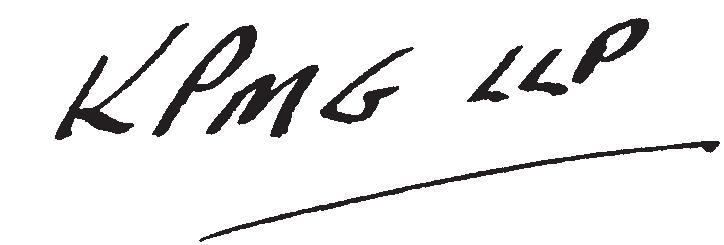
Chartered Professional Accountants
The information, other than the financial statements and the auditors’ report thereon, included in a document likely to be entitled “2018-2019 Annual Report” is expected to be made available to us after the date of this auditors’ report. If, based on the work we will perform on this other information, we conclude that there is a material misstatement of this other information, we are required to report that fact to those charged with governance
Edmonton, Canada
August 13, 2019
Responsibilities of Management and Those Charged with Governance for the Financial Statements
Management is responsible for the preparation and fair presentation of the financial statements in accordance with Canadian public sector accounting standards, and for such internal control as management determines is necessary to enable the preparation of financial statements that are free from material misstatement, whether due to fraud or error.
In preparing the financial statements, management is responsible for assessing the Entity’s ability to continue as a going concern, disclosing as applicable, matters related to going concern and using the going concern basis of accounting unless management either intends to liquidate the Entity or to cease operations, or has no realistic alternative but to do so.
Those charged with governance are responsible for overseeing the Entity’s financial reporting process.
Our objectives are to obtain reasonable assurance about whether the financial statements as a whole are free from material misstatement, whether due to fraud or error, and to issue an auditors’ report that includes our opinion.
Consolidated Statement of Financial Position
March 31, 2019, with comparative information for 2018
Credit facilities (note 10)
Commitments and contingencies (note 11)
See accompanying notes to consolidated financial statements.
On behalf of the Council:
Director Director
Consolidated Statement of Operations and Accumulated Operating Surplus
March 31, 2019, with comparative information for 2018
Consolidated Statement of Remeasurement Gains and Losses
Year ended March 31, 2019, with comparative information for 2018
Accumulated remeasurement gains, beginning of year $ 7,352,781 $ 7,352,781 $ 12,427,486
Change in unrealized remeasurement gains 2,204,022
Accumulated remeasurement gains, end of year $
See accompanying notes to consolidated financial statements.
Consolidated Statement of Changes in Net Financial Assets
Year ended March 31, 2019, with comparative information for 2018
Net
See accompanying notes to consolidated financial statements.
Consolidated Statement of Cash Flows
Year ended March 31, 2019, with comparative information for 2018
(used
See accompanying notes to consolidated financial statements.
Notes to Consolidated Financial Statements
Year ended March 31, 2019
Gwich'in Tribal Council (the "Council") is an aboriginal organization that represents Gwich'in participants in the Mackenzie Delta of the Northwest Territories. The Council was established in 1983 by the Band Councils and Metis Locals of the four communities of Aklavik, Tsiigehtchic, Fort McPherson and Inuvik. The Council is incorporated under the Canada Corporations Act and is not subject to any federal, territorial or local government taxes or similar charges.
The objectives of the Council include the following:
i. to protect and preserve the rights, interest and benefits of the Gwich'in in reference to their use, ownership and management of lands, waters and resources in the Gwich'in Settlement Area;
ii. to retain, preserve and enhance the traditional and cultural values, customs and language of; the Gwich'in in a changing society;
iii. to develop and promote economic, social, educational and cultural programs that will enable the Gwich'in to become self-sufficient and full participating members in a global society;
iv. to uphold the rights, interest and benefits of the Gwich'in in reference to the Constitution Act, Treaty 11 and the Gwich'in Comprehensive Land Claim Agreement; and
v. to receive, preserve and enhance the capital and the lands and other benefits transferred to the Gwich'in under the Gwich'in Comprehensive Land Claim Agreement signed on April 22, 1992.
1. Significant accounting policies:
These consolidated financial statements have been prepared in accordance with Canadian public sector accounting standards. Significant aspects of the accounting policies adopted by the Council are as follows:
(a) Reporting entity:
The Council is comprised of a number of controlled entities that are accountable to the Council for the administration of their financial affairs and resources They include the following:
Entity
Gwich’in Settlement Corporation
Council of Gwich’in Chiefs (inactive)
Gwich’in Harvesters Assistance Trust (2017)
Year end
March 31
March 31
March 31
Notes to Consolidated Financial Statements (continued)
Year ended March 31, 2019
1. Significant accounting policies (continued):
(a) Reporting entity (continued):
Investments in business subsidiaries are accounted for on a modified equity basis, consistent with the generally accepted accounting treatment for government business enterprises. Under the modified equity basis, the business enterprises’ accounting principles are not adjusted to conform to those of the Council, and inter-organizational transactions and balances are not eliminated. Business subsidiaries accounted for in this manner are:
Entity
Gwich’in Development Corporation December 31
Zheh Gwizuh (G.P.) Limited December 31
6354 NWT Ltd. December 31
Aboriginal Contractors Corporation December 31
The Council administers the Gwich'in Children's Trust on behalf of their beneficiaries (see note 13) In addition, the Council has the ability to appoint a portion of the members of the Board of Directors of the Gwich’in Land Use Planning Board, Gwich’in Land and Water Board, Gwich’in Renewable Resource Board and the Gwich’in Wildlife Studies Fund. The activities of these entities are not included in the consolidated financial statements of the Council.
(b) Revenue recognition:
Revenues are recognized in the period in which the transactions or events occurred that gave rise to the revenues. All revenues are recorded on an accrual basis, except where the accruals cannot be determined with a reasonable degree of certainty or when their estimation is impracticable.
Government transfers are recognized as revenues when the transfer is authorized and any eligibility criteria are met, except to the extent that transfer stipulations give rise to an obligation which meets the definition of a liability. Transfers are recognized as deferred revenue when transfer stipulations give rise to a liability. Transfer revenue is recognized in the statement of operations as the stipulation liabilities are settled.
Contributions from other sources are deferred when restrictions are placed on their use by the contributor, and are recognized as revenue when used for the specific purpose.
Notes to Consolidated Financial Statements (continued)
Year ended March 31, 2019
1. Significant accounting policies (continued):
(b) Revenue recognition (continued):
Investment income is recognized as revenue when earned. Royalties, user fees, rent, other recoveries and land reclamation fees are accounted for in the year in which the transactions or events occurred that gave rise to the revenue if the collection of the amount to be received is reasonably assured.
(c) Cash and cash equivalents:
Cash and cash equivalents includes cash on hand, balances with banks and term deposits having a maturity of three months or less which are held for the purpose of meeting shortterm cash commitments.
(d) Financial instruments:
Financial instruments are recorded at fair value on initial recognition. Derivative instruments and equity instruments that are quoted in an active market are reported at fair value. All other financial instruments are subsequently recorded at cost or amortized cost unless management has elected to carry the instruments at fair value. Management has elected to record all portfolio investments at fair value as they are managed and evaluated on a fair value basis.
Unrealized changes in fair value are recognized in the statement of remeasurement gains and losses until they are realized and they are transferred to the statement of operations.
Transaction costs incurred on the acquisition of financial instruments measured subsequently at fair value are expensed as incurred. All other financial instruments are adjusted by transaction costs incurred on acquisition and financing costs, which are amortized using the straight-line method.
All financial assets are assessed for impairment on an annual basis. When a decline is determined to be other than temporary, the amount of the loss is reported in the statement of operations and any unrealized gain is adjusted through the statement of remeasurement gains and losses.
When the asset is sold, the unrealized gains and losses previously recognized in the statement of remeasurement gains and losses are reversed and recognized in the statement of operations.
Notes to Consolidated Financial Statements (continued)
Year ended March 31, 2019
1. Significant accounting policies (continued):
(d) Financial instruments (continued):
Fair value measurements are classified using a fair value hierarchy, which includes three levels of information that may be used to measure fair value:
• Level 1 - Unadjusted quoted market prices in active markets for identical assets or liabilities;
• Level 2 - Observable or corroborated inputs, other than level 1, such as quoted prices for similar assets or liabilities in inactive markets or market data for substantially the full term of the assets or liabilities; and
• Level 3 - Unobservable inputs that are supported by little or no market activity and that are significant to the fair value of the assets and liabilities.
(e) Foreign currency:
Foreign currency transactions are recorded at the exchange rate at the time of the transaction. Assets and liabilities denominated in foreign currencies are recorded at fair value using the exchange rate at the financial statement date. Unrealized foreign exchange gains and losses are recognized in the statement of remeasurement gains and losses. In the period of settlement, the realized foreign exchange gains and losses are recognized in the statement of operations and the unrealized balances are reversed from the statement of remeasurement gains and losses.
(f) Non-financial assets:
Non-financial assets are not available to discharge existing liabilities and are held for use in the provision of services. They have useful lives extending beyond the current year and are not intended for sale in the ordinary course of operations.
Notes to Consolidated Financial Statements (continued)
Year ended March 31, 2019
1. Significant accounting policies (continued):
(f) Non-financial assets (continued):
(i) Tangible capital assets:
Tangible capital assets are recorded at cost, which includes amounts that are directly attributable to the acquisition, construction, development or betterment of the asset. The cost, less residual value, of tangible capital assets is amortized over their expected useful lives using the following methods and annual rates:
Wellness Camp
* Commencing April 1, 2015 based on the net book value of the Gwich’in Wellness Camp on that date.
(ii) Contributions of tangible capital assets:
Tangible capital assets received as contributions are recorded at their fair value at the date of the receipt and also are recorded as revenue.
(iii) Gwich’in Settlement Lands and natural resources:
Gwich’in Settlement Lands received as part of the Gwich’in Comprehensive Land Claim Agreement and natural resources that have not been purchased are not recognized as assets in these consolidated financial statements.
(iv) Works of art and cultural and historic assets:
Works of art and cultural and historic assets are not recorded as assets in these consolidated financial statements.
(v) Interest capitalization:
Interest is capitalized whenever external debt is issued to finance the construction of tangible capital assets.
Notes to Consolidated Financial Statements (continued)
Year ended March 31, 2019
1. Significant accounting policies (continued):
(f) Non-financial assets (continued):
(vi) Leased tangible capital assets:
Leases which transfer substantially all the benefits and risks incidental to ownership of property are accounted for as leased tangible capital assets. All other leases are accounted for as operating leases and the related payments are charged to expenses as incurred.
(g) Contaminated sites:
Contaminated sites are a result of contamination being introduced into air, soil, water or sediment of a chemical, organic or radioactive material or live organism that exceeds an environmental standard. The liability is recorded net of any expected recoveries. A liability for remediation of a contaminated site is recognized when a site is not in productive use and it is management’s estimate of the cost of post-remediation including operation, maintenance and monitoring.
(h) Allocation of expenses:
The Council records a number of its expenses by program. The cost of each program includes the personnel, premises and other expenses that are directly related to providing the program. The Council allocates certain of its general support expenses by identifying the appropriate basis of allocating each expense.
(i) Use of estimates:
The preparation of financial statements requires management to make estimates and assumptions that affect the reported amounts of assets and liabilities and disclosure of contingent assets and liabilities at the date of the financial statements and the reported amounts of revenues and expenses during the year. Actual results could differ from those estimates.
Notes to Consolidated Financial Statements (continued)
Year ended March 31, 2019
1. Significant accounting policies (continued):
(j) Related party transactions:
The Council enters into transactions with related parties in the normal course of operations and on normal trade terms. These transactions are measured at the exchange amount which is the amount of consideration established and agreed by the related parties.
Unallocated costs, comprising materials and services contributed by related parties in support of the Council’s operations, are not recognized in the consolidated financial statements.
(k) Budget information:
The budget information has been approved by the Council.
(l) Changes in accounting policies:
The Council has prospectively adopted PS3430 - Restructuring Transactions effective April 1, 2018
The effect of adopting this new accounting standard did not have any impact on the Council’s consolidated financial statements
(m) Future accounting changes:
The following summarizes upcoming changes to Canadian public sector accounting standards: PS3280 - Asset Retirement Obligations - effective April 1, 2021, and PS3400 Revenue - effective April 1, 2022
The Council's management is currently assessing the impact of these new accounting standards on its consolidated financial statements.
Notes to Consolidated Financial Statements (continued)
Year ended March 31, 2019
2. Cash and cash equivalents:
Wood Gundy – high interest
accounts (see note 9)
3. Portfolio investments:
Notes to Consolidated Financial Statements (continued)
Year ended March 31, 2019
4. Investment in First Nations Bank of Canada:
On October 26, 2007, the Council acquired 888,892 common shares of First Nations Bank of Canada representing approximately 7% of the total outstanding common shares at March 31, 2018. The investment is recorded at its original cost of $2,000,000 (2018 - $2,000,000) in the Council’s consolidated financial statements.
5. Investments in government business enterprises:
Development Corporation, 100% subsidiary $ 21,812,200 $ 20,990,562
Notes to Consolidated Financial Statements (continued)
Year ended March 31, 2019
5. Investments in government business enterprises (continued):
(a) Gwich’in Development Corporation:
Gwich'in Development Corporation is a private company whose principal activities include business and investment activities on behalf of the Gwich'in beneficiaries, mainly within the Gwich'in Settlement Area in the Northwest Territories. The following table provides condensed supplementary financial information for the Gwich’in Development Corporation for the year ended December 31:
The Council’s investment in Gwich’in Development Corporation is comprised of the following:
Gwich’in
Notes to Consolidated Financial Statements (continued)
Year ended March 31, 2019
5. Investments in government business enterprises (continued):
(b) Zheh Gwizuh (G.P.) Limited:
Zheh Gwizuh (G.P.) Limited is a private company and is the general partner of Zheh Gwizuh Limited Partnership and Gwich'in Investments Limited Partnership. The following table provides condensed supplementary financial information for Zheh Gwizuh (G.P.) Limited for the year ended December 31:
Results of operations:
The Council’s investment in Zheh Gwizuh (G.P.) Limited is comprised of the following:
Due from Zheh Gwizuh (G.P.) Limited
to the Council (199,285) (206,650) Net advances to (repayments by) Zheh Gwizuh (G.P.) Limited between January 1st and March 31st
Notes to Consolidated Financial Statements (continued)
Year ended March 31, 2019
5. Investments in government business enterprises (continued):
(c) Aboriginal Contractors Corporation:
Aboriginal Contractors Corporation is a private corporation whose principal activity is to develop a made in the North solution to meet the construction requirements of the Macke nzie Gas Project. The following table provides condensed supplementary financial information for the Aboriginal Contractors Corporation for the year ended December 31:
Results of operations:
The Council’s investment in Aboriginal Contractors Corporation is comprised of the following:
from Aboriginal Contractors Corporation $ 1,081,143 $ 1,070,675
deficiency attributable to the Council (875,675) (870,922) Net advances to (repayments by) Aboriginal Contractors Corporation between January 1st and March 31st and other adjustments 5,821$ 211,289 $ 199,753
Notes to Consolidated Financial Statements (continued)
Year ended March 31, 2019
5. Investments in government business enterprises (continued): (d) 6354 NWT Ltd.:
6354 NWT Ltd. is a private company that was established to acquire and hold a 100% interest in Mackenzie Valley Construction Ltd. The following table provides condensed supplementary financial information for the 6354 NWT Ltd. for the year ended December 31:
(deficiency)
The Council’s investment in 6354 NWT Ltd. is comprised of the following:
Net advances to (repayments by) 6354 NWT Ltd. between January 1st and March 31st
(2,986) Provision for impairments in value of the net assets of 6354 NWT Ltd. (1,318,830) (1,413,895)
- $ -
The Council is uncertain about the value of the net assets of 6534 NWT Ltd. and, as a result, has recorded a reduction of its provision for impairment of $95,065 (2018 - additional impairment of $76,312) as part of its overall earnings on investments in government business enterprises
Notes to Consolidated Financial Statements (continued)
Year ended March 31, 2019
6.
7 Deferred revenue:
1,843,095
Notes to Consolidated Financial Statements (continued)
Year ended March 31, 2019
8. Tangible capital assets:
The Council has received title to various lands within the Gwich'in Settlement Region including 16,264 square kilometers of land excluding mines and mineral rights; 6,065 square kilometers of land including mines and mineral rights; and 93 square kilometers of land only for mines and mineral rights. No value has been assigned to these lands in the consolidated financial statements.
Notes to Consolidated Financial Statements (continued)
Year ended March 31, 2019
9. Accumulated
142,054,167
10. Credit facilities:
The Council has a demand revolving line of credit available for use, up to a maximum of $5,000,000 (2018 - $5,000,000), bearing interest at prime rate per annum and is secured by a Council Resolution. As at March 31, 2019, $nil (2018 - $nil) was drawn against the available demand revolving line of credit.
11. Commitments and contingencies:
The Council leases its premises under operating leases. Under the current lease arrangements, the Council has the option to renew the leases upon expiry. Minimum annual lease payments to the end of the lease terms are as follows:
Notes to Consolidated Financial Statements (continued)
Year ended March 31, 2019
11. Commitments and contingencies (continued):
The Council has been named as defendant in certain wrongful termination lawsuits. Management has included its best estimate of the settlement of th ese lawsuits in accounts payable and other accrued liabilities.
12 Investment income, net:
Interest, dividends and pooled investment income includes $ 56,018 (2018 - $58,754) received from Gwich’in Development Corporation that was recognized as part of net finance costs by Gwich’in Development Corporation (see note 5 (a)).
13. Expenses by object:
Notes to Consolidated Financial Statements (continued)
Year ended March 31, 2019
14. Trusts under administration:
The Council administers the following trust on behalf of its beneficiaries Activities of the trust for the year ended December 31 is summarized as follows:
15. Financial risks and concentration of credit risk: (a) Credit risk:
Credit risk refers to the risk that a counterparty may default on its contractual obligations resulting in a financial loss. The Council is exposed to credit risk with respect to the accounts receivable, cash and portfolio investments.
The Council assesses, on a continuous basis, accounts receivable and provides for any amounts that are not collectible in the allowance for doubtful accounts. The maximum exposure to credit risk of the Council at March 31, 2019 is the carrying value of these financial assets.
The carrying amount of accounts receivable is valued with consideration for an allowance for doubtful accounts. The amount of any related impairment loss is recognized in the statement of operations. Subsequent recoveries of impairment losses related to accounts receivable are credited to the statement of operations.
There have been no significant changes to the credit risk exposure from 2018
Notes to Consolidated Financial Statements (continued)
Year ended March 31, 2019
15. Financial risks and concentration of credit risk (continued):
(b) Liquidity risk:
Liquidity risk is the risk that the Council will be unable to fulfill its obligations on a timely basis or at a reasonable cost. The Council manages its liquidity risk by monitoring its operating requirements. The Council prepares budget and cash forecasts to ensure it has sufficient funds to fulfill its obligations. The Council also has access to a demand revolving line of credit of $5,000,000 to help fund additional working capital requirements as they may arise.
Accounts payable and accrued liabilities are generally due within 60 days of receipt of an invoice.
There have been no significant changes to the liquidity risk exposure from 2018
(c) Market risk:
Market risk is the risk that changes in market prices, such as foreign exchange rates or interest rates will affect the Council’s income or the value of its holdings of financial instruments. The objective of market risk management is to control market risk exposures within acceptable parameters while optimizing return on investment.
(i) Foreign exchange risk:
The Council is exposed to financial risks as a result of exchange rate fluctuations and the volatility of these rates. The Council does not currently enter into forward contracts to mitigate this risk.
There has been no change to the risk exposure from 2018.
(ii) Interest rate risk:
Interest rate risk is the risk that the fair value of future cash flows or a financial instrument will fluctuate because of changes in the market interest rates.
Financial assets and financial liabilities with variable interest rates expose the Council to cash flow interest rate risk.
There has been no significant change to the interest rate risk exposure from 2018
Notes to Consolidated Financial Statements (continued)
Year ended March 31, 2019
16. Segment disclosures:
The Council provides a wide range of services to its members. Services are delivered through a number of different programs and departments. All services are evaluated collectively and not reported in separate segments. Overall activities of the Council are evaluated regularly by the Board of Directors and management in allocating resources and assessing results.
17. Related party transactions:
Related parties are those entities consolidated or accounted for on a modified equity basis in the Council’s consolidated financial statements.
Related parties also include key management personnel and members of the Board of Directors of the Council. Salaries, wages and employee benefits and honoraria expense includes a total of $976,616 (2018 - $872,133) paid to key management personnel.
18 Comparative information:
Certain comparative information has been reclassified to conform with the consolidated financial statement presentation adopted in the current year.
The Gwich’in Lands and Resources Dept. (GLR) developed a Strategic Plan to guide its efforts throughout the year. We now have a plan going forward to better direct our energy and efforts to strengthening the DGO and RRC organizations that GTC works with on a daily bases.
The Dept. of Lands Main High Level Goals and Objectives for this year is:
1. Gwich’in interest representation in matters pertaining to land, water, resources, and wildlife management provisions of the GCLCA.
2. Transboundary Agreement (YTBA) are realized.
3. Develop and set out systems and processes for land and resource administration and the use of Gwich’in Private Lands.
4. To engage and consult with Designated Gwich’in Organization’s in matters and issues related to land and resource management in their community and within the GSA where appropriate.
Current issues and opportunities lands staff have been working on:
GLR is engaged with Yukon Parks regarding the establishment of a territorial park in the Gwich’in Secondary Use Area in the Yukon. GLR staff traveled to each of the communities and presented on this matter to the DGO’s and RRC’s. Serious concerns were raised in the communities and GLR has notified Yukon. Staff are working with Legal and Intergovernmental Relations to ensure that GCLCA rights are upheld and that GTC is adequately consulted on this matter.
Vuntut Gwich’in First Nation (VGFN), Yukon and Canada are proposing to correct the locations of 4
site-specific VGFN settlement lands located within the Gwich’in Secondary Use Area that were not accurately mapped at the time of VGFN’s land claim negotiations. The Parties have established a process to undertake a land exchange of Crown land for Settlement land under 9.6.1 of the VGFN Final Agreement. The land proposed to be exchanged totals 16 hectares. When an agreement was reached between the Parties, this triggered consultation duties with GTC for the 4 parcels located within the Gwich’in Secondary Use Area. These consultations commenced on December 20, 2016 and are currently ongoing.
First Nation of Na-cho Nyäk Dun GLR has been assisting in the transboundary negotiations and overlap agreement for the First Nation of Na-cho Nyäk Dun (NND). NND is currently negotiating a transboundary and overlap agreement with the Federal and Government of the Northwest Territories for traditional use rights for land within the GSA and Kasho Got’ine area of the Sahtu. The draft agreement is currently being reviewed by the Federal Government. GTC has had initial discussions with NND and Government and is reviewing ways to be better engaged and consulted as the negotiations move forward.
The Porcupine Caribou Herd Harvest Management Plan is part of the Porcupine Caribou Harvest Management Strategy. The PCMB initiated the strategy, which has three parts:
1. The Harvest Management Protocol Agreement; 2. The Harvest Management Plan (this Plan); and 3. The Native User Agreement (NUA).
The Protocol, signed by all the parties, set out how the Plan was to be developed. This included
a Harvest Management Plan Working Group to draft the Plan. The Working Group was made up of a representative from each of the eight Parties. The Protocol also includes a separate Native User Agreement (NUA). This agreement will deal with allocation issues and harvest commitments for First Nations and Inuvialuit.
NUA is between the Native user communities, and signed by the respective Aboriginal management authorities. The NUA was finalized and has been circulated for consideration and discussion by the First Nations and Inuvialuit. GTC staff will present the NUA to the GTC Board of Directors for approval.
Previous agreements and plans that establish the content for NUAs that the Parties have signed:
• Porcupine Caribou Management Agreement (1985)
• Protocol Respecting the Development of a Harvest Management Strategy in the Canadian Range of the Porcupine Caribou Herd (2007)
• PCH Harvest Management Plan (2010)
• PCH Harvest Management Plan –Implementation Plan (2010)
The strategy is in its early stages and GTC has requested a meeting with Yukon, initial meeting will help GTC to determine what level and forms of consultation and community engagement would be most appropriate. GTC has informed Yukon that we look forward to working with Yukon on developing a long-term Parks Strategy that is sustainable.
In June 2009, the Yukon Government and the VGFN signed off on a North Yukon Regional Land Use Plan. The Plan provides a Sustainable Development framework for land management in the North Yukon Planning Region. One of the recommendations that stemmed from this plan was the establishment of a Whitefish Wetland protected area and a study area for the proposed Summit Lake-Bell River protected area and related land withdrawals. From this recommendation, the Yukon Government with the VGFN set out to
designate the Summit Lake –Bell River area as a natural environment park called the Dàadzàii Vàn Territorial Park. GTC has engaged the communities and is planning to consult with the Parties in the Gwich’in Settlement Area.
Chance Oil and Gas (formerly Northern Cross) Communications and Consultation Plan
Chance Oil and Gas (formerly Northern Cross) has initiated talks on developing an Engagement and Consultation Plan with affected First Nations. Chance Oil sent GTC a letter December 1, 2017 addressing their intentions and in April arranged a meeting with GTC to meet Yukon Government (YG) Order in Council placed on Chance Oil and Gas, good first meeting basic information sharing. In August 2018, GTC and Change Oil and Gas signed the Engagement and Consultation Agreement. Chance Oil has applied to YG for a five year lease, GTC is reviewing the request.
Taxation of Gwich’in Municipal Lands –Undeveloped Lots in Hinterland Areas within Municipal boundaries in all Gwich’in Communities Government of the Northwest Territories Properties and Taxation Department and the Town of Inuvik have been levying taxes on GTC’s Rural Undeveloped Lands. These Parcels of Lands were acquired through Land Claim negotiations and intended to be used by Gwich’in Participants in each community to practice their traditional and cultural activities. These lands are intended for snaring rabbit, harvesting plants, and maybe even camping. They did not select these parcels of land to be developed. As long as these Lands remain un-developed the GNWT or Town of Inuvik do not have the authority to tax these lands. GLR has contacted the GNWT-MACA in Yellowknife and requested that this matter be resolved and we also let Town of Inuvik know that they should not be charging the Gwich’in taxes as an incentive to develop those lots.
Gwich’in and Inuvialuit Trans-boundary Agreement
Gwich’in and Inuvialuit Trans-Boundary Agreement 1992 – GLR may require a legal opinion on this matter with respect to some of the hunting rights
provided. There is also other issues with respect to this agreement and confusion about why they went and added to this old agreement and what reciprocal hunting and trapping rights do we share.
Lots of issues and concerns out there with regards to trapping, hunting, fishing, and campsites on Gwich’in lands. The GNWT Department of Environment and Natural Resources (ENR) is responsible for regulating all of this use and recording what location people are getting trees from and locations of trap lines. GTC will work with our co-management partner the Government of the Northwest Territories to come up with better strategies and options to discourage un-authorized harvesters.
Gwich’in Private Lands are traditional use areas of the Gwich’in people. They are the ancestral lands that are identified for Gwich’in use by Gwich’in and their descendants. Individuals and families who are not Participants of the Gwich’in Comprehensive Land Claim Agreement require permission to hunt, trap, or set up campsites on Gwich’in Private Land and these areas are not for sale. Should people purchase camps or gift camps to anyone they first require permission from the GTC Lands Department to use the area. Non-Participants may own the assets (campsites, cabins) on Gwich’in Land but do not own the land or have rights to the resources of those lands.
Land Use files worked on by GLR between April 1, 2018 and August, 2019:
This is a list of Authorizations issued since 2018. These activities are monitored and administrated for compliance through-out the duration of any activity on Gwich’in Private Lands. Most activities in the GSA are for research with a few application for road access and campsites. All major activities for access or campsites are reviewed by DGOs and RR Councils in the areas where the activities are taking place and all projects on Gwich’in Lands requires the Authorization holder to hire a Gwich’in monitor.
GTC18Q001 = Dept. of Infrastructure, KM 126, Quarrying Activity.
GTC18Q002 = Dept. of Infrastructure, KM 147, Stockpiling/Quarrying Activities.
GTC18R002 = Geological Survey of Canada, Various Locations, Richardson Mountains.
GTC18R003 = GRRB, Study of Sheep, Parcels 5 and A, Black Mountain Area
GTC18Q003 = LJs Contracting, KM 126, Quarrying Activity.
GTC18R007 = Stantec Consulting, KM 147, Fish Habitat System Study
Applications Withdrawn
GTC18R002 = Memorial University, Research Along Dempster Highway.
GTC18T001 = Tetlit Zeh Forestry and Bioenergy Corporation, Harvesting Trees
Granted 2019
GTC19R001 = Dartmouth College, Alluvial Fan Studies, Richardson Mountains.
GTC19C002 = Chief Julius School, University of Alberta. Campsite at Peel River
GTC19R003 = University of Alberta, Permafrost studies
GTC19R004 = BBC Frozen Planet II, Collection of Footage/film on slumping
GTC16R003= Geological Survey of Canada, Steve Kokelj, Study of permafrost slumping sites along the Dempster and Richardson Mountains.
Engage and Consult with Designated Gwich’in Organization’s in matters and issues related to land and resource management in their community and within the Gwich’in Settlement Area (GSA) Lands and Resources is presently working on improving our working relationship with DGO’s and RRC’s. GLR wants to improve on communicating and sharing of information that will allow better management of cabin registration, wildlife and forest harvesting and private land usage. GLR attended the Gwichya Gwich’in RRC in Tsiigehtchic in January and explain our new approach on collaboratively working together. A presentation was done at the RRC Regional meeting basically going through why we have a Department and what the Lands Department’s roles
and responsibilities are in relation to working with DGO and RRC’s. GLR is stressing the importance of their roles and responsibilities and what they have been delegated to them from the land claim and their responsibilities to Participants in their communities.
GLR will start working with Tetlit Gwich’in DGO and RRC and again start doing an inventory of Midway Lake festival site and look into the issues and start informing anybody and everybody that they must contact the Gwich’in Tribal Council if they would like to put a camp at the site. The goal and objective of this initiative is to have updated information on all on-the-land users and identify Non Gwich’in Participants who will be requires to get a lease from the Gwich’in for campsites or homes on private land.
All new campsites must be pre-approved by local DGOs and Renewables Resources Councils. This process is going to be encourages and adhered to as they are responsibility for approving any new campsite or camps on Gwich’in Land.
GLR will be sending notices to non-participants that are residing on GTC private land, informing them that leases are required. More than likely the list would come from the updated cabin database and we will have to verify with DGOs in each community through workshops to determine who the occupants of land are in the Gwich’in Settlement Area.
GLR is reviewing and updating our internal land management administration process – this will increase our internal efficiencies. This process will be drastically improved upon once our new digital management system is in place. GLR wants to have the new system in place by end of Fall 2019. GLR has been working with our Contractor on this file and will possibly have a municipal land management module developed as well. Once this system is up and running it is expected that each
DGO will identify who will be working with land matters.
Cumulative Impacts Monitoring Program (CIMP) and Audit
CIMP is a requirement of the GCLCA and the Mackenzie Valley Resource Management Act. Funding commitments from the Government of Canada Treasury Board are secured every year to fully implement CIMP. Proposals are funded on an annual basis. Research projects may be longer than one year but the researcher has to resubmit proposals for funding each year. CIMP guidelines recommend researchers enter into partnerships with other organizations for research projects and encompass an ecosystem approach to research rather than individual projects. GTC will continued to participate in the CIMP, with greater effort now being placed on developing research proposals that address the questions and concerns of the GSA.
GTC is a member of the PAS Steering Committee. The GTC does not have any Protected Areas nominations for the GSA and is utilizing the Gwich’in Land Use Plan (GLUP) as the mechanism for land use protection. The GLUP includes Conservation Zones, Special Management Zones and General Use Zones. GLR is presently reviewing the GLUP (five year review) and will ensure that adequate protection of lands is provided within the GSA. The GTC will continue to reference the GLUP as the main instrument for ensuring Protected Areas within the GSA.
GTC continues to be a member of the Northwest Territories Regional Contaminants Committee (NWT RCC). The federally funded NCP is for research projects looking at effects of long range contaminants brought to the north through ocean and air currents. Categories include Human Health, Communications, Capacity and Outreach, Environmental Trends and Community Based Monitoring projects. GLR submitted their annual funding proposal to participate within the National and Regional Coordination and Aboriginal Partnerships on the NWT RCC. The NCP Management Committee reviews, approves
and decides funding levels on submitted research proposals. GTC will continued to participate in the NCP, with greater effort now being placed on developing research proposals that address the questions and concerns of the GSA.
The GTC Lands & Resources staff participated in the Regional RRC meeting in Tsiigehtchic -January 2019. Each community RRC is represented at the Regional RRC meeting except Aklavik. The Regional RRC meeting allows for the community members to come together with government and other wildlife and resource management groups within the GSA to discuss projects and programs with regard to resources and wildlife management for the GSA. The Regional RRC meeting is held in a different community of the GSR each year.
Completes Partnership with Department of Lands identifying camps on Public and Gwich’in Lands.
GLR signed a contribution agreement in 2018/2019 with GNWT Department of Lands after summiting proposal which was subsequently approved for $26,000. We shared this money with all DGO/RRC and they were asked to hire a land use recorder and identify camps around 25km vicinity of the four Gwich’in communities. Locations were marked on a map, owners, identified and where possible a pictures was taken of the camps. We delivered on this proposal and in fiscal year 2019/2002 we will be doing another round of consultations and meetings with DGO and RRC Officials to go over maps and make sure we have every camp accounted for in the GSA.
On December 20, 2018, the Supreme Court of Canada ruled in favour of the First Nation litigants and quashed the Peel Plan developed unilaterally by Yukon Government and ultimately passed in 2014. The Supreme Court of Canada sent the Parties back to the point in the process of final consultation and approval, well beyond the point where government could potentially make significant modifications to the Plan. 8 years since the release of the Commission’s Final
Recommended Plan in 2011, this was a hard won battle for First Nations in terms of the lands and resources co-management regime envisioned in the Yukon Umbrella Final Agreements. Once again, the integrity of First Nation Agreements were upheld by the Courts. Following the court’s ruling, the Parties quickly got to work developing a nonbinding Letter of Understanding that set out the purpose and objectives of the Parties’ collective and collaborative work to finalize and approve the Plan. Through the development of a Senior Liasion Committee with representatives from each of the Parties, this committee was tasked with updating the Plan and conducting the final public consultation, followed by intergovernmental consultation for approval by the Party principals. GTC is very satisified with the work done by this committee to ensure a Plan that is up to date and reflective of the collaborative efforts committed to by all the Parties to jointly implement the Plan based on its strategic management actions, research recommendations and policy recommendations. The approval and finalization process is pending.
Our work in Gwich’in Lands and Resources on GCLCA land claim implementation will continue in a coordinated way among GTC departments, DGOs and their GCLCA partners. GTC Lands and Resources will continue to provide effective and timely research, monitoring and decision making support for the Gwich’in Tribal Council.
If you have any questions with regard to this report or would like to discuss the projects identified in the report you can contact the Lands and Resources Staff at the GTC.
Erika Tizya-Tramm: Transboundary Specialist
The past year has been marked by some very significant events and developments in the area of Gwich’in Tribal Council (GTC) Intergovernmental Relations. This year’s report reviews some of these starting with developments relating to leadership engagement with the Government of Canada.
In April 2018, Grand Chief Bobbie Jo sent a letter to the Honourable Carolyn Bennett, Minister of Crown-Indigenous Relations and Northern Affairs, requesting a meeting to establish a bilateral process of leadership discussions between the GTC and the Government of Canada to address a range of issues of concern to the GTC. Chief among these issues were the on-going Gwich’in community leadership discussions about self-government, the “cede, release and surrender” provisions of Chapter 3 of the Gwich’in Comprehensive Land Claim Agreement (GCLCA) and the implications for modern treaty holders of the Government of Canada announcement about changing the funding approach for treaty negotiation costs from loans to grants.
This letter led to subsequent discussions between the GTC and senior officials of Minister Bennett’s department of Crown-Indigenous Relations and Northern Affairs (CIRNA) and to a leadership summit meeting between the GTC and Minister Bennett that took place at the GTC offices in Inuvik on June 25, 2018. Agreement was reached to establish a new, bilateral GTC-Government of Canada table to address some of the key issues that were identified in the Grand Chief’s April letter to Minister Bennett. The aim of the new table was to focus on the “cede release and surrender” aspects of Chapter 3 of the GCLCA that Minister Bennett agreed should be discussed and noted that “the idea of a full and final agreement is wrong.” The table would also discuss the level of underfunding of the
costs of implementation of the GCLCA, updating dispute resolution procedures of the modern treaty and the process for making appointments, and also the approach to applying Canada’s new policy position of changing the approach to support for treaty negotiation costs from loans to grants. The Government of the Northwest Territories, that is also a party to the GCLCA, was later invited to join the treaty modernization table.
The issue of treaty loan cost reimbursement for modern treaty holders such as the GTC that had taken out and repaid loans from Canada was confirmed in. A decision was announced then that the principal amount of these loans, plus interest paid to Canada by the modern treaty holders, would be reimbursed over a five-year period in equal instalments, commencing in April of 2020. For the GTC, the total amount of the treaty loan principal plus interest is $13.1 million. This will result in five annual treaty loan cost reimbursement payments by the Government of Canada of $2.6 million in April of each of the next five fiscal years, starting next April.
The GTC had prepared a policy proposal to Canada that emphasized that early signers of modern treaties, such as the GTC, should be restored to the same financial position that they would have been in had they not been required to take out treaty loans. This would have created an equitable position between the GTC and other Indigenous Nations that were early signers of modern treaties and those Indigenous Nations that are now or in future will be negotiating modern treaties. However, the Department of Finance did not accept this proposal. The Government of Canada ultimately decided to proceed with the approach outlined above.
Meetings of the treaty modernization table commenced in September of 2018 and have continued on a frequent basis since then. Progress
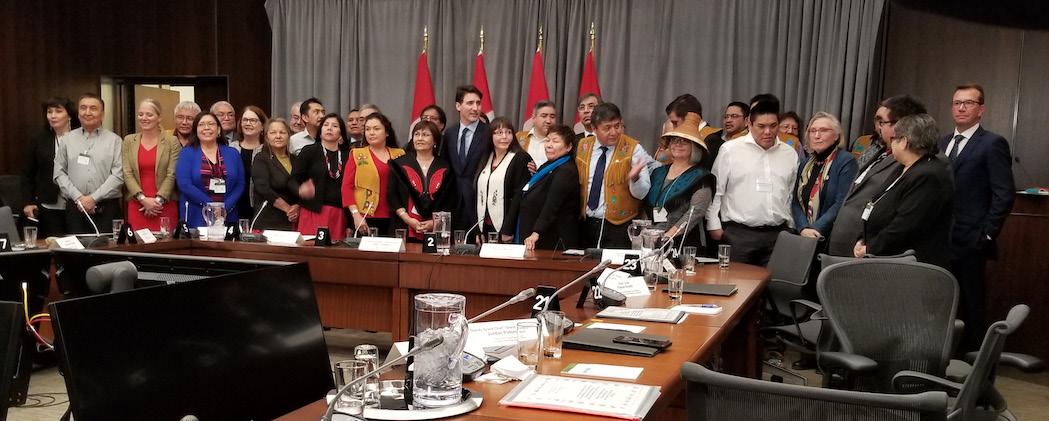
is being made to research, analyze and discuss different aspects of the issues that the table is focusing on, working towards achieving the goal of an agreement on measures to address these priority issues that will modernize the treaty.
Meetings with the Prime Minister and with Government of Canada Deputy Ministers Also Yielded Results
Some important progress was made in the Land Claims Agreements Coalition (LCAC) Prime Minister’s Forum meeting in January of 2019 and in a GTC meeting with the Government of Canada’s Deputy Minister’s Oversight Committee (DMOC) on March 6, 2019. The January meeting of leadership of the LCAC with Prime Minister Justin Trudeau was part of the new practice established in 2017 by the Prime Minister of having annual summit meetings with the leadership of Indigenous Nations from four groups. These groups are modern treaty holding First Nations, the Inuit, the Metis and First Nations without modern treaties. GTC’s Deputy Grand Chief Jordan Peterson was one of the LCAC leaders who made an oral presentation to the Prime Minister in Ottawa on January 8, 2018. The LCAC strategy for the meeting was for each political leader who made a presentation to speak on one of the long-standing LCAC policy change proposals.
The Deputy Grand Chief’s presentation topic was the LCAC proposal for a Modern Treaty Implementation Review Commission (MTIRC). He advised the Prime Minister of the challenges
faced by the GTC in terms of the level of treaty implementation presently being received by the GTC. The key message conveyed was the need for the GTC and for modern treaty holders to receive adequate levels of treaty implementation and other funding, coordinated and provided on a multi-year basis. This message appears to have hit the mark. The day following the Prime Minister’s Forum, CIRNA departmental officials advised the GTC’s Director of Intergovernmental Relations that CIRNA now is open to receiving multi-year funding proposals. In addition, there have since the January meeting been tangible signs of response by officials of the CIRNA Modern Treaty Implementation Office (MTIO) to the LCAC proposals for a Government of Canada Modern Treaty Implementation Policy and for discussion of a MTIRC or similar body.
In response to an invitation from the Modern Treaty Implementation Office, GTC’s Deputy Grand Chief and Director of Intergovernmental Relations met with and made a presentation to the Government of Canada’s Deputy Minister’s Oversight Committee (DMOC). This committee consists of the Deputy Ministers from all of the Government of Canada Departments. It is responsible for monitoring and providing direction to the Government of Canada regarding its responsibilities to fulfill commitments under treaties made with Canada’s Indigenous peoples.
The meeting of the GTC with the DMOC occurred on March 6, 2019. GTC made a presentation to
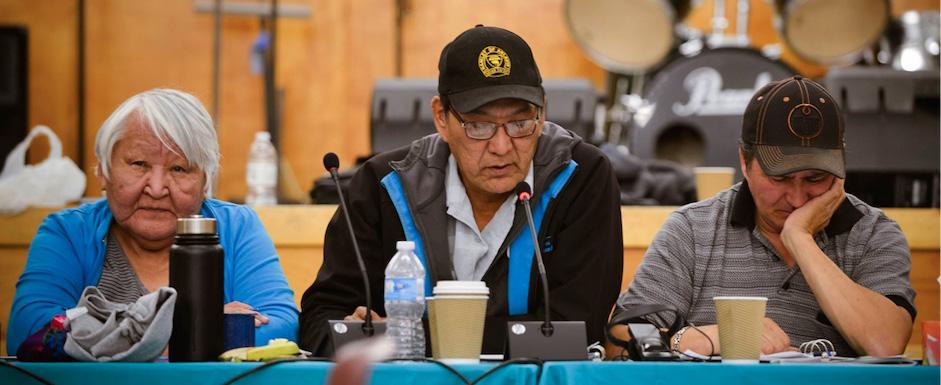
the Deputy Minister’s entitled, “Perspectives of a Modern Treaty Holder Without Self-Government on Current Treaty Implementation Funding and Nation Rebuilding Challenges.” The key message conveyed was that resolving these funding challenges was essential for establishing a firm basis for a nation-to-nation relationship between Canada and the Gwich’in Nation, based on the two Gwich’in treaties with the Crown – both Treaty 11 and the GCLCA that is built on the foundation of Treaty 11. We specifically emphasized the need for the Government of Canada to confirm interim GTC treaty implementation funding pertaining to the Yukon Transboundary Agreement (YTA), which is Appendix C of the GCLCA. We also urged Canada to also develop a plan for providing the GTC with on-going, annual YTA implementation funding. This call to action too was heard by Canada. Soon after the GTC meeting with the DMOC, the Government of Canada confirmed that it was providing the GTC with the level of YTA implementation funding that the GTC had requested in its YTA implementation funding proposal that was submitted in August of 2018. This marked the second year in a row that Canada has provided the GTC with significant YTA implementation funding, which was provided for the first time ever in March of 2018. GTC is continuing to advocate with Canada for a commitment to provide adequate, annual, timely and predictable YTA implementation funding to the GTC.
2018 Gwich’in Special Assembly on Self-Government Confirmed New Approach to Negotiating Gwich’in SelfGovernment
The GTC Self-Government Facilitated Meetings held March 26 to March 28, 2018, arrived at a consensus on two broad themes. One was that the approach to self-government needs to focus on building strong communities. There was also recognition that a strong Gwich’in Nation would be maintained and sustained by this foundation of strong Gwich’in communities. Following these meetings a Gwich’in Tribal Council Special Assembly on Self-Government was held in Aklavik on September 14, 2019. Delegates to this Special Assembly built on the consensus themes reached at the March 2018 Facilitated Meetings. The approach decided at the Special Assembly reflects the fact that the authority to decide how best to advance Gwich’in self-government, as established by the GCLCA, lies with each of the four Designated Gwich’in Organizations (DGOs) in each of the communities of Aklavik, Fort McPherson, Inuvik and Tsiigehtchic.
At the September 14 Special Assembly, three of the Gwich’in communities DGOs decided to continue to advance self-government collaboratively with the GTC, through a collaborative, communitybased approach. They are the Ehdiitat Gwich’in Council (EGC) in Aklavik, the Gwich’ya Gwich’in Council (GGC) in Tsiigehtchic and the Tetlit Gwich’in Council (TGC) in Fort McPherson.
The Nihtat Gwich’in Council (NGC) decided to pursue self-government separately, on an individual community-specific basis and the Special Assembly acknowledged and respected this choice. It was also acknowledged by the Assembly that there was a need for each of the DGOs that chose to partner with the GTC in pursuing Gwich’in selfgovernment to have greater organizational and fiscal capacity. The GTC was directed to pursue funding adequate to ensure that the EGC, GGC, the TGC and the GTC have the necessary resources and capacity to be fully engaged in the self-government negotiation process.
Since the Special Assembly there have been frequent meetings of the Gwich’in Partners selfgovernment negotiations table. Work is proceeding on revising the 2016 Gwich’in Self-Government Agreement in Principle (AiP) to reflect the new approach and the priority of focusing first on core governance matters. Funding has been secured from Canada to support the collaborative, communitydriven approach to self-government negotiations. The priority for the current year is to address the Special Assembly directive to secure adequate funding to provide each of the Gwich’in partner DGOs with the organizational and financial resources needed to properly engage in both the negotiations process and in the on-going, essential process of communication and engagement with Gwich’in participants who reside both within each community, as well as those residing outside of the Gwich’in Settlement Area (GSA).
Gwich’in Specialists in Child and Family Services (CFS) Advised the Government of Canada On Development of Indigenous Peoples CFS Legislation
The Government of Canada committed to implementing all of the from the Report of the Truth and Reconciliation Commission (TRC). The first section of the report deals with Child Welfare and calls, “…upon the federal government to enact Aboriginal child-welfare legislation that establishes national standards for Aboriginal child apprehension and custody cases.” The Government of Canada undertook an extensive engagement and consultation process with Indigenous Governments and with other representative Indigenous groups
throughout 2018 before drafting Child and Family Services (CFS) legislation for consideration by the Parliament of Canada. GTC participated extensively in this engagement process. This included meetings of leadership and senior officials with both the then Minister of Indigenous Services, the Hon. Jane Philpot, and with senior officials of her department, Indigenous Services Canada (ISC). The Minister requested an opportunity for her senior officials to meet directly with Gwich’in front line CFS professionals with experience and expertise in the CFS field to obtain their input into the process of developing new CFS legislation. In response to this request, a CFS engagement session was held in Inuvik on October 22-23, 2018.
This meeting was very productive and was a good example of the core elements of the and of the Gwich’in culture in action. The ISC senior official in attendance at the session indicated later to GTC’s Director of Intergovernmental Relations that she found the sessions to be very useful in the government’s process of seeking input to help them draft the legislation. She also said that the session changed her view of her role as a public servant. Thank you to all those Gwich’in CFS professionals and GTC officials who either participated in the engagement meetings, or who helped facilitate them and the participation of their colleagues in them. Participants in the meetings are pictured here.
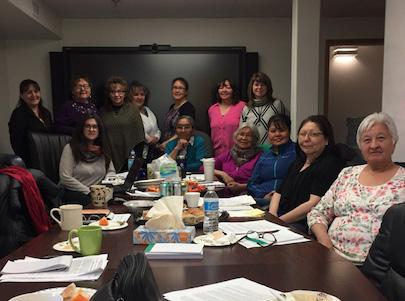
Some of the themes that were emphasized by the Gwich’in CFS professionals have been reflected in the legislation that was passed by Parliament in June 2019. The CFS legislation was Bill C-92, . Bill C-92 is enabling in nature and it should be considered as a first step. It provides flexibility for Indigenous Nations to take various approaches to assert and to exercise their jurisdiction in the CFS field. A key mechanism for achieving this enabled by Bill C-92 will be negotiation of a “tripartite coordination agreement” between the Indigenous Nation, the territory or province in question and the Government of Canada. This will facilitate the exercise of CFS jurisdiction and Indigenous Nation laws in this area and these laws prevailing over the laws of Canada, a province or territory. This coordination agreement would also address the question of the transfer of the needed financial resources to the Indigenous Government to enable it to effectively exercise its asserted jurisdiction in practice. It will now be necessary for the Gwich’in Nation to consider how best to advance and assert its right to exercise CFS jurisdiction, now that Bill C-92 has become law.
Bill C-92 is only one of several important legislative and policy initiatives of the Government of Canada that the GTC Intergovernmental Relations Department was engaged in providing input to over the past year. Others include: Bill C-91, : ; and the Arctic and Northern Policy Framework (ANPF).
Gwich’in Combat Trump Administration’s Proposed Oil and Gas Leasing Program in the Alaskan Arctic National Wildlife Refuge (ANWR)
The United States Administration of President Trump has proposed an oil and gas leasing program for the Arctic National Wildlife Refuge (ANWR) in Alaska. This proposal poses a serious direct threat to the birthing and calving ground of the Porcupine Caribou Herd, 85 percent of the harvesters of which are Gwich’in harvesters on the Canadian side of the Canada-U.S. border. On June 18, 2018, the GTC submitted comments to the U.S. Bureau of Land Management (BLM) regarding the scope of issues to be addressed in the Coastal Plain Oil and Gas Leasing Program Environmental Impact Statement (EIS). THE primary issue raised was the serious
threat that this proposed program posed to the Porcupine Caribou Herd. We also called for equal emphasis to be placed in the EIS on traditional knowledge (TK) of the Porcupine Caribou as is placed on “scientific knowledge.”
Shortly after this letter was submitted to the BLM, the Gwich’in people from Canada and the United States met at the biennial held in Tsiigehtchic. A was passed at the 2018 Gathering. It reiterated a position that the Gwich’in people have held since the 1988 when the Gwich’in Elders gave direction to the Gwich’in people to seek permanent protection of the Porcupine caribou calving grounds within the ANWR. The 2018 resolved: “That the United States President and Congress recognize the rights of the Gwich’in people to continue to live our way of life by prohibiting exploration and development in the calving and post-calving grounds of the Porcupine Caribou Herd.” Here is a picture of 2018 attendees discussing the issue.
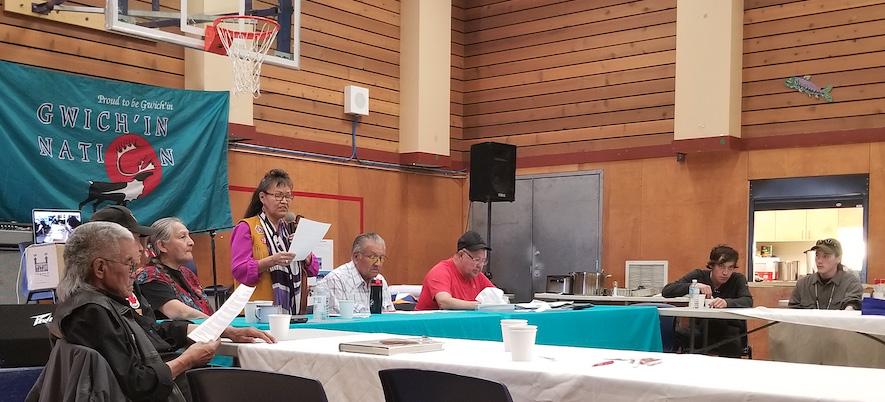
The GTC Intergovernmental Relations Department and Cultural Heritage Department worked together to prepare a submission and supporting research on the draft Coastal Plain Oil and Gas Leasing Program EIS. The GTC submission submitted to the BLM on March 13, 2019, emphasized the threat posed by this proposed program on the Porcupine Caribou Herd and the importance of considering Gwich’in Traditional Knowledge of the Porcupine Caribou Herd in assessing the environmental effects of the proposed program. It also stressed that the trans-border effects of the proposal should be considered. Neither of these issues was adequately if at all addressed in the BLM’s draft EIS.
Accompanying the GTC submission was a Phase 1 study of Gwich’in Knowledge of Porcupine
Caribou that was commissioned by the GTC Cultural Heritage Department and authored by Kristy Benson, who is an external consultant team member of the Department. This study is entitled, “Gwich’in Knowledge of Porcupine Caribou, State of Current Knowledge and Gaps Assessment.” It documented the current state of recorded Gwich’in knowledge of the Herd, that stems from the special and enduring relationship that the Gwich’in have with the Porcupine caribou resulting from the fact that Gwich’in have been hunting Porcupine Caribou for thousands of years. The Phase 1 study identified gaps in the recorded traditional knowledge. These gaps will be filled by a follow-up, Phase II .
The GTC submission emphasized that failure to consider Gwich’in traditional knowledge of the Porcupine caribou, in tandem with consideration of other data sources, would render the BLM’s leasing EIS both incomplete and invalid as an analysis of the potential environmental impacts of the proposed oil and gas leasing program. Indications are that the BLM has recognized these points and the need to address them in the EIS.
A successful organization is only as good as its people. Human Resources Management is designed to maximize employee performance in service of the organization’s strategic objectives. Human Resources as a department, is in its second year at GTC and in its short existence many achievements have been accomplished in services of the Gwich’in Tribal Council’s mandates.
The team consists of dedicated employees. In early 2019, faced with a steep learning curve Danya Harrison accepted the challenge and adapted well to her role as Human Resources Officer. Danya has a friendly disposition and with enthusiasm, supports employees and ensures timely processing and administration of human resources files. We are very fortunate to have her on our team, taking on various requests, ready to lend a hand where ever she is needed.
Verna Pope, is our Manager of Education and Training. GTC is very fortunate to have her. Her knowledge, work ethic and dedication to her craft is evidenced by her recent recognition as a Premier’s award recipient. Verna and her team have provided services and support to Participants through the management and administration of the Indigenous Skills and Employment Training Program (ISETS), the Taii Trigwatsii Skills Partnership Fund Program (SPF), the Gwich’in Education Fund, and the First Nations Inuit Childcare Initiative (FNICCI).
In this past year, we welcomed 13 new members to our team but we also lost 15 people for a final head count of 37 by the end of fiscal year 2018/19. The attrition rate for the organization is 40%. Most employees live and work in Inuvik. The majority of employees are females and Gwich’in Participants.
There are a number of functions within Human Resources and 2018/19 saw accomplishments in these areas:
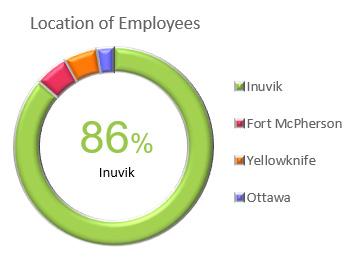
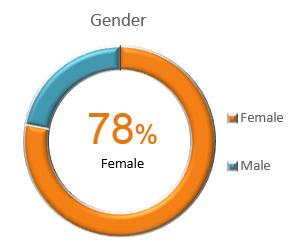
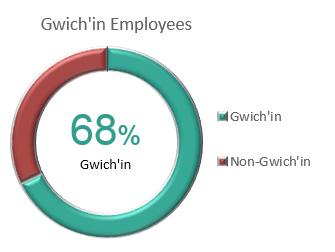
Workforce Planning & Talent Management: In Recruitment, in addition to welcoming a number of people into the organization, we also standardized and updated forms. In Organizational Design, restructuring in the fall 2018 lead to redistribution of work amongst Operations employees in order to maintain services to Gwich’in participants.
Total Rewards: GTC changed benefits providers to bring additional benefits to employees at a reduced cost. It resulted in employee’s having orthodontic coverage and an Employee and Family Assistance Plan. These added benefits help to increase the overall health and wellbeing of employees as they continue to do good work in service of Gwich’in people.
Strategy: We facilitated 7 strategic planning workshops and supported departments to develop SMART objectives for fiscal 2019/20.GTC has a total of 77 objectives which team members will work to accomplish in the coming year.
Employee Relations: We worked through a number of employee relations issues. The goal of coaching and providing advice to employees is to empower employees to be able to resolve issues on their own if possible. We encourage accountability and compassion and coach employees to communicate with one another to increase understanding and perspective so misunderstandings do not escalate into bigger issues.
Learning & Development: In 2018 Helen Sullivan, Strategic Advisor, identified the organizational learning priorities and secured funding for GTC to provide training and development to employees in 2019. A number of department specific training opportunities were also identified in the strategic planning sessions.
HR Metrics, Reporting & Financial Management: The department received approval to source a Human Resources Information System (HRIS) to automate and streamline processes such as requesting time off, provide real time access to employee information, reporting and reconciliation of data and a new Applicant Tracking System for Recruitment. GTC’s ability to readily access employee aggregate data will help in
timely decision making, contribute to employee engagement by using technology to optimize processes and remove manual transactions so employees can focus on their work.
Professional Practice: We continued to adhere to legal requirements as they pertain to human resources policies and practices to promote organizational values and manage risk. In addition to the day-to-day work, HR was also tasked with office management and overseeing the education and training department. The department also provided HR best practice consultation to DGOs as requested.
Health, Wellness & Safe Workplace: GTC continues to promote health and safety. There were zero recordable injuries in fiscal 2018/19. The Health and Safety Committee continue to meet regularly, adding to the team as necessary and rolling out initiatives and creating an awareness to increase the health and safety of employees.
Gwich’in Internship Pilot Project (GIPP): In fiscal 2019/20, GTC will be entering into the last phase of the GIPP program with Janelle Wilson finishing her term with GNWT in the fall of 2019 and Kaylynn Koe and Peter Greenland completing their terms with the Canadian Government and moving on to the Government of the Northwest Territories.
High employee turnover is a challenge. In 2019 Human Resources will look to develop and execute strategies to decrease turnover and stabilize the workforce on a long term basis. Our aim is to increase the capacity of employees to set a high standard of Gwich’in excellence through execution of the GTC Vision Mission and Values. Look for continued process improvements and efficiencies in Performance Management and the development of an overall GTC Corporate Scorecard. Nakhwàh nachihdik geenjit hąį’ choo nàkhwahnùh.
(Thank you for letting me walk with you.)
Mahsi Choo Olivia Mensah, Director of Human Resources
Gwich’in Tribal Council continues to co-fund employment officer positions in each of the Gwich’in Settlement Area communities to assist with program recruitment efforts and to assist participants in job search, resume development, career planning, post-secondary funding applications and access to computer, fax, printer, job postings, and other resources. Each Employment and Career Development Officer(s) have a dedicated resource area for the general public to access services in the following locations:
• Tetlit Gwich’in Council – Fort McPherson
• Aklavik Indian Band Office – Aklavik
• Gwichya Gwich’in Council Office –Tsiigehtchic
• Nihtat Gwichin Council – Inuvik
• Gwich’in Tribal Council Office – Inuvik
A total of 1535 participants accessed services through the employment officers and the GTC main office.
The Gwich’in Tribal Council continues to partner with other service providers such as the Inuvialuit Regional Corporation (IRC) and Education Culture & Employment (ECE) where possible, to maximize delivery of career development workshops such as resume writing, cover letter, and student financial assistance applications.
• GTC participated in the BDEC Teacher Orientation to provide information on programs and services for students on August 2018.
• Career Development Officer participated in the Aurora College Orientation September 2018.
• Career Development Officer was invited to the East Three Career and Planning Class September 2018.
• Manager and Career Development Officer
completed community open house visits to promote programs and services in Inuvik and Tsiigehtchic September 2018.
• Career Development Officer delivered career planning sessions to Taii Trigwatsii Aklavik Program on October 2018.
• Career Development Officer, in partnership with ECE and IRC, co-facilitated resume development workshop in November 2018 to Aurora College’s Office Administration Program.
• Career Development Officer hosted career labs consisting of email creation, resume/cover letter writing and job search November 2018.
• Career Development Officer participated at Aurora College Health Fair December 2018.
• Career Development Officer presented to GTC ASETS program information to Taii Trigwatsii Inuvik participants January 2019.
Capacity Development
Career Development Officer including the employment officers from Inuvik and Fort McPherson and Aklavik received systems training April 2018 and February 2019.
GTC ASETS funded the Nihtat and Gwichya DGO Employment Officers to attend career coach training at the Winnipeg Transition Center in December 2018.
The Gwich’in Tribal Council continues to be an active member of the Regional Training Partnership (RTP) Committee. The Committee meets on a monthly basis to collectively identify education, training and employment needs based on regional labour market demands and discuss potential opportunities for participants. Involvement with the RTP, allows the Gwich’in Tribal Council to maximize training dollars associated with participant opportunities. The Committee consists
of representatives from the following organizations:
• Aurora College
• Aurora Research Institute
• Beaufort Delta Education Council
• Education, Culture and Employment
• Gwich’in Tribal Council
• Industry, Tourism and Investment
• Inuvialuit Regional Corporation
• Municipal and Community Affairs
• Department of Infrastructure
• Western Arctic Business Development Services
The Gwich’in Tribal Council continues to be a member of the Yukon College’s President’s Advisory Committee on First Nations Initiatives (PACFNI). Meetings are held quarterly throughout the year to discuss program development and community deliveries, and updates on Yukon College Initiatives.
The Gwich’in Tribal council attends the BDEC’s Student Initiatives committee to discuss joint school and student initiatives.
Aboriginal Skill and Employment Training Strategy (ASETS) funding is administered by the Gwich’in Tribal Council on behalf of Employment and Skills Development Canada (ESDC).
For the 2018-2019 year, the Gwich’in Tribal Council received an extension with ASETS funding. The funding allowed the Gwich’in Tribal Council to continue offering programming and financial supports to participants residing within the Gwich’in Settlement Area.
In an effort to maximize ASETS funds, the Gwich’in Tribal Council makes a concerted effort to partner with other regional organizations to deliver programming that supports labour market demand as well as anticipated training needs throughout the region. Consideration is also given to potential opportunities associated with regional capital projects that occur within the year and in advance of future projects.
For 2018-2019, the ASETS Agreement Holder activity plan identified nine activity areas to deliver programming based on existing and new initiatives:
1) Trades
2) Safety Training
3) Marine Safety Training
4) Training On The Job (TOJ)
5) Mobile Trades
6) Occupational/University College Access Programs
7) Post-Secondary
8) Tourism
9) Childcare
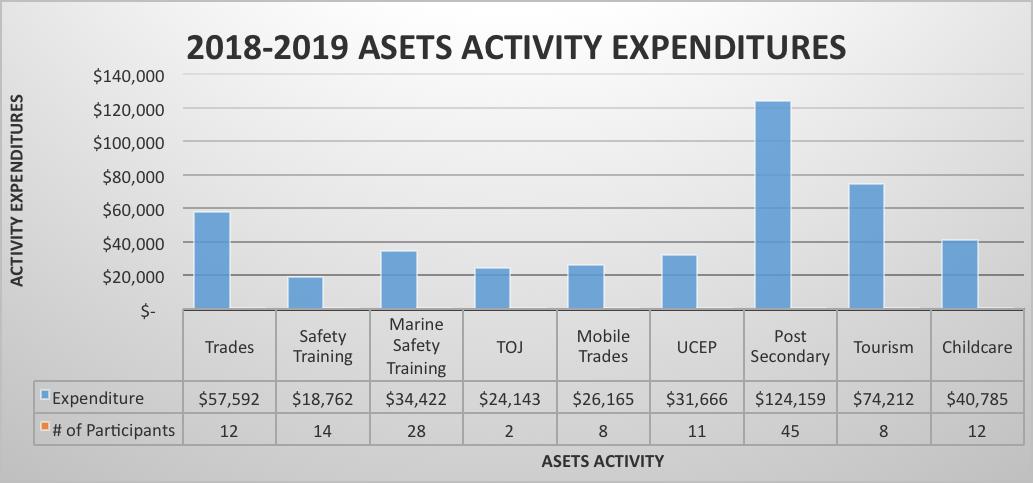
The Gwich’in Tribal Council partnered with Aurora College to deliver a twelve week Building Trades Helper program in Tsiigehtchic. The program was scheduled for January 07, 2019 to March 29, 2019 Participants were also provided with personal protective equipment. A total of eight participants completed the Building Helper Trades Program on March 29, 2019.
During 2018-2019, the Gwich’in Tribal Council provided financial supports to nine participants who pursued trades related training in such programs as heavy equipment operator, class 1 drivers, automotive service technician, pre-apprenticeship carpentry, culinary arts and general pilot license.
GTC sponsored three participants to attend the UAV Drone Training offered by Inuvialuit Community Economic Development Organization held August 20-25, 2018.
GTC provided funding to Nanzu Environmental and Demolition to assist with training expenses to renew asbestos certification for eight individuals. Training was provided by Pinchin West in Inuvik on April 9 and April 10, 2018.
GTC provided funding to Nanzu Environmental and Demolition to assist with training expenses to attend mandated supervisor training for six individuals. Training was provided by Workers Safety and Compensation Commission in Inuvik on May 1-2, 2018.
Gwich’in Tribal Council funded twenty-eight participants to take the Small Vessel Operator Proficiency (SVOP) course hosted by Marine Transport Services, GNWT Department of Infrastructure. GTC provided funds to cover training allowances and transportation expenses. Participants received SVOP certification; a requirement to work at local ferry operations.
In 2018-2019, the Gwich’in Tribal Council provided funds to two organizations under the
Training on the Job activity. Funds were provided to the Tetlit Gwich’in Council to train one participant to assume the role of Youth and Elder Coordinator from October 2018 to March 2019. Funds were also provided to Plumb Crazy Mechanical to provide work experience for one Gwichin participant in the plumber trade from October 2018 to February 2019.
The Gwich’in Tribal Council partnered with Education Culture & Employment, Industry Tourism & Investment, Inuvialuit Regional Corporations and Aurora College to offer its second delivery of the ten-week Merging Arts and Technology program October 9, 2018 to December 14, 2019. The program involved the merging of traditional arts and crafts with the introduction of technology where participants learned new skills on 3D laser printers, laser cutting, silk screening and digital arts. A total of four Gwich’in participants, two from Inuvik and two from Fort McPherson, completed the Merging Arts & Technology program.
The Gwich’in Tribal Council partnered with Aurora College, Aurora Institute, Inuvialuit Regional Corporation, Industry, Tourism & Investment to provide safety training and business skills to graduates of the Merging Arts, Crafts and Technology Program January 15-18, 2019. Participants were provided training and information on how to apply for small business grants, information on the GNWT tendering process and business incentive policy. A total of four Gwich’in participants, two from Inuvik and two from Fort McPherson, completed the training.
The Education and Training Department have been able to fund a total of approximately fiftysix full time post-secondary Students from within the Gwich’in Settlement Area (GSA) from April 01, 2018 to March 31, 2019. Students received funding from the Aboriginal Skills and Employment Training Strategy (ASETS) for top up living allowances, tuition, and books. A total of thirteen students were also provided with funds to assist with childcare expenses.
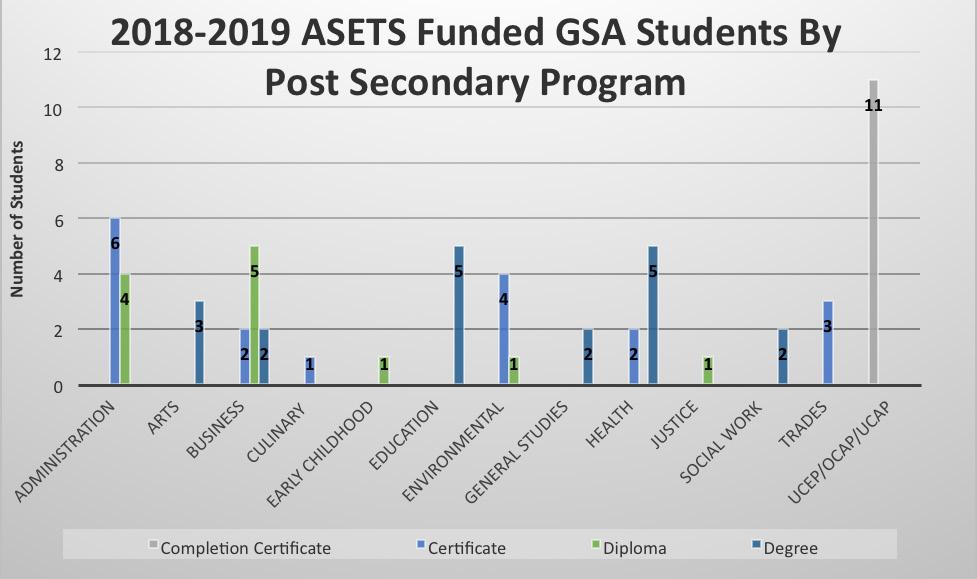
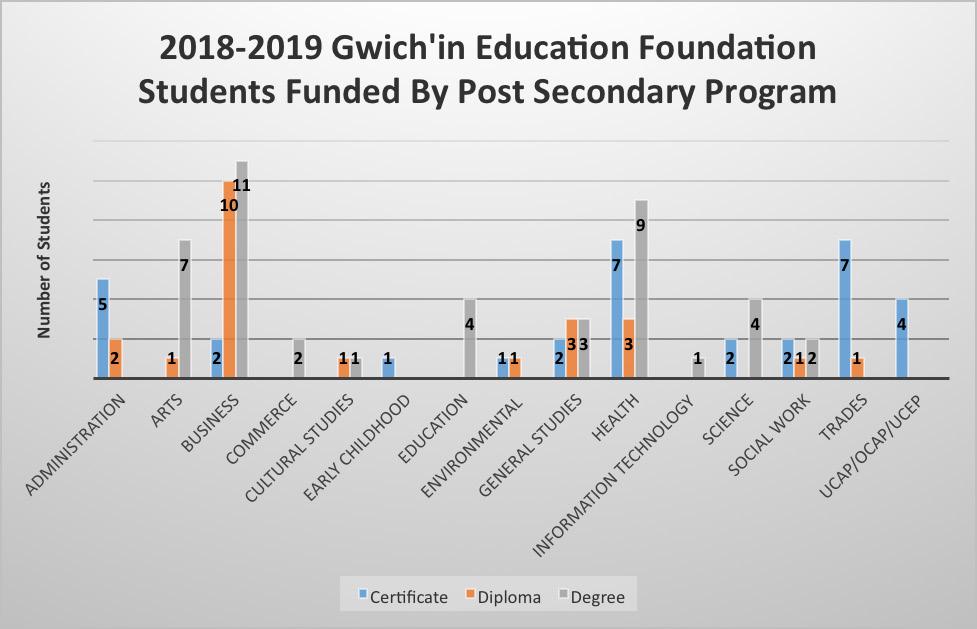
The Education and Training Department have been able to fund a total of one hundred full time postsecondary Students from April 01, 2018 to March 31, 2019 under the Gwich’in Education Fund. The GTC issued approximately $207,225 in top up bursaries to post-secondary students. Graduation gifts were issued to eleven high school students and thirteen post-secondary students. Twenty-three students were recognized and issued a scholarship payment for achieving an overall grade point average of eighty percent or more during their program of studies. Eligible Gwich’in students were from within the GSA and all provinces and territories.
During the 2018-2019 academic year, GTC funded thirty-three students in certificate programs, twentythree students in diploma programs and forty-four students in degree programs.
Under the First Nation and Inuit Childcare Program, the GTC currently provides program funding to the Children’s First Society, T’loondih Healing Society and Aklavik Child Development Centre. Funds provide assistance with operational expenses such as wages, professional development, utilities and nutritional food items.
The Taii Trigwatsii program is an eight-monthlong training program that teaches participants Gwich’in traditional knowledge, life skills, adult basic education, workplace essential skills and entrepreneurship. Taii Trigwatsii is a training to employment program to support Gwich’in Beneficiaries and community members to build capacity towards self-government. Taii Trigwatsii is funded under the Skills and Partnership Fund (SPF) through Employment and Skills Development Canada (ESDC).
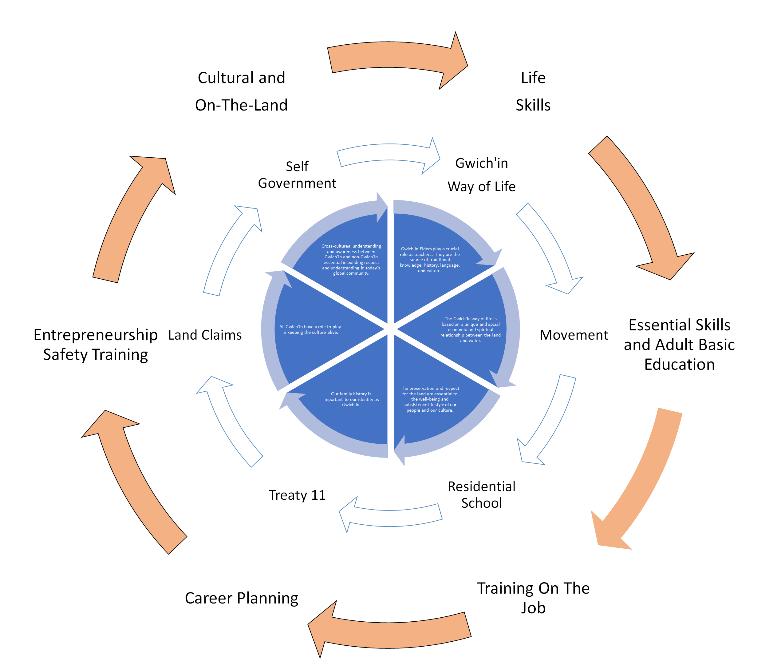
Taii Trigwatsii is centered on the Gwich’in worldview; the program was designed with the framework of Gwich’in values, traditional and cultural orientation and wellness. Taii Trigwatsii’ will utilize Gwich’in Elders throughout the program to provide guidance, encouragement, support, and the transfer of Gwich’in ways.
The first delivery of Taii Trigwatsii was delivered in Aklavik April 04, 2018 to November 09, 2018. Participants completed the following components:
Life Skills – 4 weeks
On the Land – 2 weeks
Cultural Awareness – 3 weeks
Essential Skills & Adult Basic Education –16 weeks
Career Planning – 2 weeks
Safety Training – 1 week
Training on the Job – 3 weeks
The Aklavik Delivery saw 14 out of 20 or 70% of participants who completed the program successfully.
Taii Trigwatsii Targets:
Gwich’in Participants
Women
Youth
Overall Goal: 75% of Participants will pursue upgrading, technical training and or training on the job through the ASETS program.
It was proven that attending life skills brought togetherness, calmness and wholeness to the Aklavik Taii Trigwatsii participants.
For four weeks, the participants acquainted themselves with each other through a series of heavy topics that allowed them to tap into selfrealization by; sharing, discovering and releasing feelings and emotions. Topics included journaling, sharing, residential school, addictions, abuse, confidence building, and self-esteem.
The on-the-land component of the Taii Trigwatsii program is to expose the Gwich’in culture and traditions as much as possible. It helped the Aklavik participants refresh, practice and enhance the already acquired bush skills they had tucked away. Participants completed the following activities:
• rabbit snare setting
• berry picking
• tent setting, wood stove, boughs for floor
• seasonal activities – fishing, trapping, berry picking
• dressing properly
With precise planning from the Taii Trigwatsii team, the participants were able to spend two separate weeks out on the land just a few kilometers up the river at Eddie Greenland’s bush camp.
While at camp, the participants demonstrated leadership and took initiative when tasks needed to be completed.
The cultural awareness component of the Taii Trigwatsii program is to encourage a deeper understanding of the Gwich’in traditions. It is essential for the participants to be involved in experiential learning as it focuses on the language, hands-on learning and bridging with Elders where participants learn:
• Gwich’in language lessons and storytelling;
• step by step instructions, hands-on and demonstrations;
• Elder expertise and wisdom; and
• self-identity, self-awareness and self-confidence.
The goal is to weave cultural and language activities into other components of the program to further express how important it is to keep the Gwich’in traditions alive.
The participants shared their already acquired cultural skills by getting involved and sharing what they know.
The essential skills and adult basic education component of Taii Trigwatsii program is an extensive section that focuses on academic skill gaps. It is designed to bring participants up to a minimum mathematics and literacy level relative to career and technical paths.
SkillPlan, Taii Trigwatsii Consultants, developed customized math, reading document use and basic science modules to assist with instruction. Once the modules are finalized and completed, it will be Gwich’in owned and easily accessible for future delivery.
The Aklavik participants were the first to use the modules and displayed excellent outcomes.
After observations and student consultations, Donna Neyando, newly hired Lead Instructor decided to experiment with adding additional course content to elevate student boredom, fill the daily schedule gaps and ways to include teaching the Gwich’in history.
The proposed changes to the curriculum included addition of Gwich’in history with the inclusion of novel studies that are easy reads. Novels are by a Gwich’in author.
6 Topics in 2 week intervals
10 lessons = 1 lesson/day
1.5 hours/lesson
3 Novels in 4 week intervals
20 chapters = 1 chapter/day
1.5 hours/chapter
Participants completed a career planning session that included career exploration, researching post-secondary colleges & universities (entrance requirements, location, costs), and budgeting (maximizing student funding by developing a shopping list using sales flyers and maximizing/ developing meal plans).
Gov’t of NWT Department of Education presented information on student financial assistance and apprenticeship training.
Participants completed job search activities such as Identification positive traits that employers look for, resume and cover letter preparation and preparing for an interview.
The Aurora College set up their computers for the participants to take the safety tickets online. All participants passed the online courses which included Transport of Dangerous Goods (TDG), Workplace Hazardous Materials Information System (WHMIS), and Standard First Aid and CPR.
The participants were placed with local employers to complete three weeks of Training on the Job (TOJ). Employers included the Hamlet of Aklavik, Aklavik Indian Band, Aklavik Housing Association, Aklavik Community Corporation, and Aklavik Hunters and Trappers. Upon completion of the job placements, participants were able to review their TOJ feedback form that identified their strengths and weaknesses as an employee. Five Gwich’in participants were offered TOJ placements.
A wrap-up week and the completion ceremony was held on November 8, 2018. The completion ceremony was attended by approximately 100 people consisting of participants, family and friends along with GTC, Service Canada and community leaders.
The second delivery of Taii Trigwatsii was scheduled for Inuvik, January 07, 201 to August 16, 2019. The project team expected to have a higher number of applicants for the Inuvik Delivery. The project team developed a ranking system that was based on the Taii Trigwatsii proposal submission to ensure fairness for participant selection. The new process ranks all applicants on priority selection criteria as well as placement scores on placement skills testing. A member from the Designated Gwich’in Organization was invited to participate in selection to reduce subjectivity. This model will be used as we move forward with the remaining deliveries.
Recruitment and marketing activities included use of social media, posters and information sessions. The Project Team hosted information sessions for interested applicants and conducted participant assessments in November 2018.
Taii Trigwatsii received a high number of applicants (forty-nine) that included Gwich’in and Inuvialuit, including two applicants from outside the Gwich’in Settlement Area. A total of forty-four (thirtytwo Gwichin and twelve Inuvialuit) applicant assessments were completed. Twenty applicants were accepted; fourteen women and six males.
Program intake saw higher numbers of applicants who identified as accessing social assistance programs. The Project team held in information session soon after program intake was completed on December 06, 2018. The GNWT’s Education Culture and Employment Income Security division was invited to participate in the information session for participants to ask questions on how social assistance benefits would impact benefits from the Taii Trigwatsii program.
Enhancement to the program included establishing an introductory week to inform participants of what to expect, student conduct, program layout, placement testing and introduction to emails. The activity schedule was revised for program components to have a better flow starting with an introductory week and life skills. Life skills was also revamped to focus on the self, traumas, and healing, where sections would be facilitated by GTC wellness staff and residential schools be facilitated by the Inuvialuit Regional Corporation Residential Schools unit. Essential Skills reading and document use component of the program layout has a Gwich’in focus where modules incorporate history and culture. Practical applications and activities have been incorporated in the math modules to give participants a hands-on approach.
In partnership with the Aurora College, participants were required to complete placements at the start and end of the program to capture testing for benchmarks and to monitor progress.
Aurora Campus, Aurora College, was contracted to provide classroom space for the Inuvik Delivery. Classroom space is adequate with WIFI access where participants will become familiar with attending an educational setting.
The participants started out with the introductory week. This week was used to introduce the participants to the program, the contents of the program (Life Skills, Cultural Week, On-The-Land, Essential Skills, safety week, TOJ). We also brought in specific individuals such as the President of the GTC, Vice President of GTC, Health and Wellness Department, Education & Training and the Career Development Officer to speak to the participants about their life decisions and how they arrived at their jobs.
From January 14th to February 1st, 2019, the Taii Trigwatsii participants attended a Life Skills session with Resolution Health Support Program workers; Catherine Francis, Susan Peffer, Jeffrey Amos, Debbie Gordon-Ruben and Janet Stafford, GTC Outreach Wellness worker. The topics included trauma, residential school, confidentiality, family then & family now, blanket exercise, drugs and alcohol, self-care & suicide prevention,
The first day of Life Skills, participants introduced themselves and soon after started working on heavy topics. Throughout the three weeks, participants learned about peer pressure, substance abuse, residential school, self-care and the dangers of sharing partners. A huge part of the three weeks, participants were able to share their own personal stories.
Elders, Winston Moses and Bella Kay were invited to take part in the classroom and speak to Gwich’in Cultural knowledge. Both elders shared stories about their up-bringing long ago, which was an eye opener for some participants.
In the beginning of February 2019, the Taii Trigwatsii participants had a cultural week with Leanne Lennie. The purpose of this cultural week was to show the participants how to operate a sewing machine and how to put together a canvas bag. The participants got so involved in the project that some brought in their own materials to share with other participants to give their bags a little
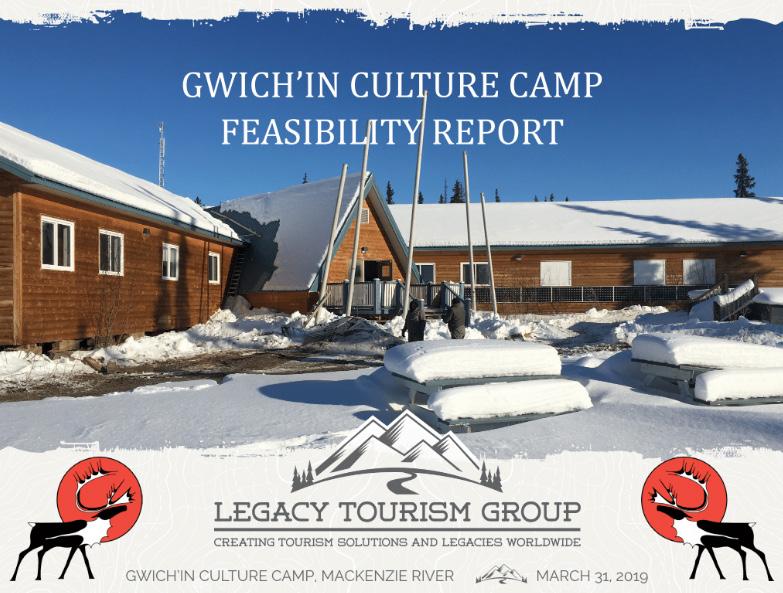
bit of color and style. All the participants had the opportunity to learn how to work with a sewing machine. The GTC provided all the materials in which the participants had the chance to make themselves a canvas bag (uhchuh) along with two little sugar (soogaii) and tea (lideii) bags.
Participants had to cut out the material with the patterns, pin the bag together and sewed with the sewing machine to put it all together. The sewing activity was well received by participants.
From March 11- 15, 2019 participants attended an On-The-Land program facilitated by Sarah Jerome, Ernest and Alice Vittrekwa at the Jerome’s Bush Camp. Elders Ernest Vittrekwa and Winston Moses were invited to participate.
Participants learned how to set three 10X12 canvas tents, how to arrange the poles to hold up the tent
and use spruce boughs to insulate the floor part of the tent.
The one week session included activities such as:
• Morning Greetings: How Are You? – group discussion
• Lateral Violence
• Life Skills
• Gwich’in Lessons
• How to cut up reindeer meat and make dry meat
• How to skin and cut up a moose head How to pluck geese and cut up fish
As of March 2019, Taii Trigwatsii Inuvik held the following participant targets:
Gwich’in Participants: 15/20 or 75%
Women 09/20 or 45%
Youth 13/20 or 65%
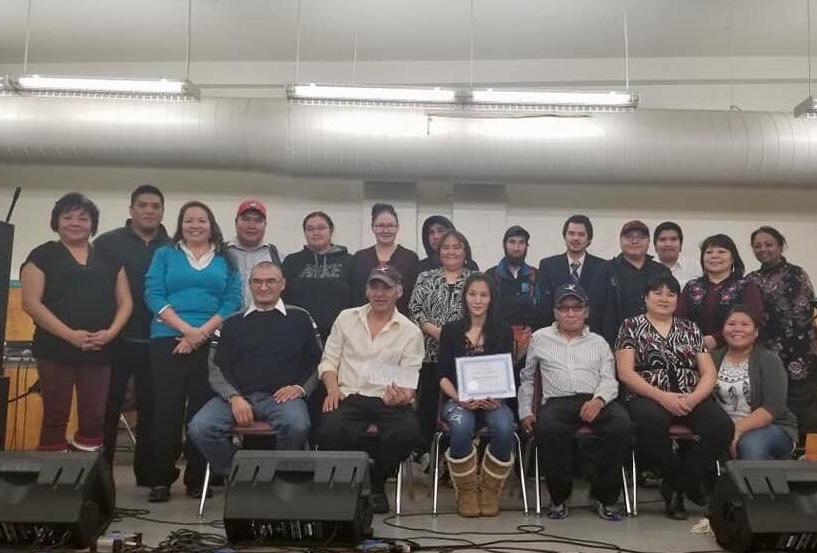
Taii Trigwatsii Project Team
Kyla Ross has been in the role of the Career Development Officer for Taii Trigwatsii from March 2019. Kyla brings with her many years of experience working with participants. Kyla brings great support to the Project Team.
Donna Neyando joined the GTC as the Lead Instructor in August 2018. Donna brings with her many years of teaching where she is able to fully engage participants with hands on learning as it relates to the Gwich’in way of life, culture and tradition.
Celina Jerome joined the SPF Team as the Program Coordinator in January 2019. Celina brings with her many years of experience working as a Career Development Officer with Education, Culture and Employment as well as the GTC.
Together, they make a great team that will support, engage and provide their expertise to help make the program successful.
The GCLCA’s economic objectives are to maintain and strengthen the traditional Gwich’in economy and to achieve Gwich’in economic self-sufficiency. Several economic development initiatives were undertaken in the past year which meet those objectives.
A Mining and Minerals Strategy was developed, incorporating input from each Gwich’in community. The strategy will serve as a framework for future potential mineral development and mining activity on Gwich’in lands. The strategy is inclusive of a wide range of participants’ views, including leadership within the Gwich’in community and the broader voice of Gwich’in in the Northwest Territories. Recommendations include cataloguing and compiling all GSA data in one place, conducting a thorough review of existing data for a clearer understanding of mineral potential with emphasis on gold and diamonds, training Gwich’in participants on how to prospect for minerals, and the importance of supporting interested participants to become professional geoscientists.
A Feasibility Report on potential development of the Gwich’in Camp recommends particular marketdriven infrastructure modifications and upgrades, the utilization of funded health and wellness opportunities, and product development for the tourism market. We will be pursuing funding to complete a detailed Business Plan and Implementation Plan to make full use of this unique cultural and economic resource.
Status of Women Canada approved 100% funding for GTC’s $264,982 proposal to address the economic security and prosperity of Indigenous women engaged in the traditional arts and crafts sectors. The initiative will address systemic gaps through a needs assessment, followed by a gap analysis and an action plan. This will capitalize upon opportunities
availed by the opening of the Road to Tuktoyaktuk and will gather input from women in all Gwich’in and Inuvialuit communities along the “Road to Tuk”. A two year project, its findings will be used to support funding for development of infrastructure, training, equipment and other element required to grow this women’s economic sector, as determined. The project is scheduled to commence in fall 2019.
The Economic Development Officer provided consulting assistance to 8 entrepreneurs and existing businesses in the past year, over the course of 25 appointments. Sectors served were contracting, transportation, tourism, arts & crafts and services.
Gwich’in entrepreneurs and business owners also had the opportunity to take part in a federal procurement workshop which took place in Inuvik. A representative from the Office of Small and Medium Enterprises (OSME) also registered some businesses in the federal database during the course of the workshop.
We were successful in attracting the annual workshop of the Mackenzie Valley Resources Management Act (MVRMA) to Inuvik this year, and played a key role in the 3-day workshop’s planning and implementation. Gwich’in participants from all four communities were able to attend.
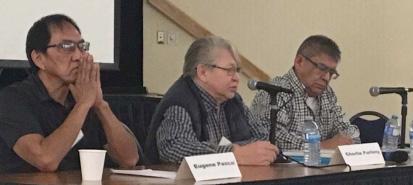
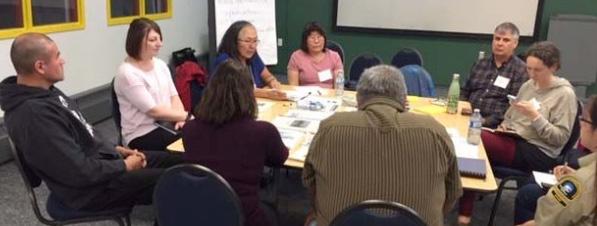
The GTC EDO participated in the planning of the 2019 Arctic Development Expo. This represents significant re-branding and re-orientation from the former Arctic Energy & Emerging Technologies Conference, in response to changes in the energy sector. The EDO also represents the GTC on the Northwest Territories Tourism Board, and at the local Inuvik Tourism Stakeholders meetings. We have had the opportunity to provide input into restructuring funding priorities of the Northern Aboriginal Economic Opportunities Program (NAEOP) which is administered by the Canadian Northern Economic Development Agency.
The GTC EDO was able to obtain funding to participate in national Indigenous conferences such as Cando, as well as the Indigenous Leadership Program offered by the Banff Centre.
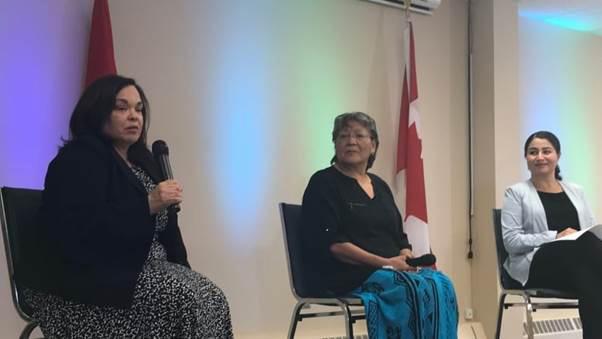
The Wellness Department is busy reviewing their work plans for the new fiscal year 2018-2019 for the Resolution Health Support Program, Cultural Support Worker, Program Support Worker and community activities for this year. This year and as in previous years we will work with the Designated Gwich’in Organizations (DGOs) in each of the 4 communities. (Aklavik, Tsiigehtchic, Fort McPherson, Inuvik).
The wellness staff worked on a number of different proposals including Crime Prevention, NWT Senior’s Society, HSIF (Health Canada), YOUth MATTER Conference, Anti-Poverty, Healthy Choices and On the Land Collaborative.
Anti-Poverty: Received $20,000 to do Spring/Fall hunt and luncheons in the 4 Gwich’in communities. Each community will receive $5000.
Funding from GNWT Anti-Poverty was to assist communities to do a spring or fall harvesting hunt (Grandfather, father, son) project and to provide 2 luncheons throughout the year. What the men harvest was to be shared with their community. The Wellness Department will work with the DGO’s to advertise for this project.
Healthy Choices Fund: $74,970. This funding is geared towards 4 goals.
1) To encourage Participants to make healthy choices;
2) To establish support networks and sustainable partnership within the community and the GSA;
3) To coordinate and schedule health related services to assist participants struggling with challenges related to Alcohol & drugs, mental health & wellness, Healthy relationships/healthy families; residential school trauma and affects and after-care support programs, services, partnerships, networks and groups;
4) To coordinate and facilitate two (2) on-the-land weekend sessions for participants that focus on: to reconnect with the land, traditions, values and practices; teaching, learning and practicing proven after-care guidelines and practices; develop and accepting relapse and prevention plans and discussing support structures and methods available within the group of participants (how they can help each other).
On the Land Collaborative: $125,000. This funding is to support families with on the land teachings within the family. A number of families and also DGOs were eligible to apply for funding based on a proposal submission of the planned activities. Over the years GTC has tried different options for On the Land programming, so this year the Wellness Department built on the previous fiscal year 2018/2019 to support families as we received a lot of positive feedback and reports.
NWT On-the-Land Collaborative held their tour this year in the Beaufort Delta. Partners and community advisors from the NWT attended a 2-day tour of projects we funded. Our first tour was at Rachel Reindeer Wellness camp. Children’s First Society utilized the Gwich’in Camp grounds for the week of September 10-14, 2018 where one group went to the camp September 11th and received traditional teachings from Alice & Ernest Vittrekwa who explained and showed the funders how to clean, cut and different ways of preparing fish and how to use all the parts. The highlight was Alice always engaged with the people and continued to ask if they had any questions as well as Ernest shared his experiences and how they work together as a team. Another highlight was picking some traditional medicines and the uses. A student doctor was part of the Children’s First team and was amazed how these plants can be used.
Community Visits: To provide information on programming for this fiscal year. We worked with the DGO’s in each of the four (4) Gwich’in communities. Programs focused on the above funding received.
Some discussion from the communities of Aklavik and Fort McPherson include mentorship with community agencies such as Health & Social Services, Community Health Representative’s, Community counseling, leadership role, elders and other mentors from the community; Suicide Intervention/Prevention; A.A groups-need more support; Education & awareness on addictions, peer support, bullying, etc. Will work with the DGO’s and community groups and leaders to address these concerns/issues.
The RHSW program continues to provide emotional support to Indian Residential School survivors and their family members on a daily basis. More and more individuals are requesting applications to attend treatment programs down south. Families are also seeking family treatment programs but limited to only one in BC.
• September 25th, 2018 Gwich’in Services Department travelled to Tsiigehtchic for community tour and held a feast during the evening. Great turnout in Tsiigehtchic. Lots of questions pertaining to funding sources for programming for their community and who can assist.
• October 1-3, 2018 Aklavik community visit.
Cultural Support Workers: The Resolutions Health Support Worker continued to stay in daily contacts with our Cultural Support Workers. Cultural Support Workers continue to document visits and provide monthly reports to the Resolutions Heath Support Worker. The statistics is shared with the funder. This fiscal year, GTC is funding an office space and an additional parttime Cultural Support Worker in Fort McPherson to support the current workers and to service Tsiigehtchic.
Wellness Camp Programming for 2018-2019: In previous discussion we were looking at the camp
as a multi-purpose facility for rental, programming, meetings, etc. In the past two years GTC was able to secure external funding to meet some of the requirements in the Arctic Energy Alliance Energy audit. Further work is required in 2019/20202 to complete all upgrades.
GTC’s Economic Development Specialist was able to secure external funding to conduct a feasibility study of the Gwich’in Camp. Wellness along with other GTC staff members participated in the Gwich’in Camp Feasibility study and did site visits.
The Wellness staff assisted the Children’s First Society and Inuvialuit Regional Corporation in their annual children and staff on the land orientation held at the Gwich’in camp utilizing the grounds.
Wellness staff participated in the Elder Abuse Awareness Event in which a total of 100-150 people showed up to share in a meal, music/entertainment and tons of door prizes. It was scheduled to take part at the Jim Koe Park but due to weather it was relocated to the Ingamo Hall Friendship Centre. It was a great event and members from the Charlotte Vehus Home, Billy Moore Home and the Long Term Care came to take part.
October 21-23, 2018: NWT Senior Society Meeting in Yellowknife focusing on advocacy for Elder Abuse campaign. This meeting focused on organizations to work together for more awareness on Elder Abuse and Mentorship.
Due to the number of tragedies that have happened both within the Gwich’in Settlement Area the Wellness Department was busy providing support for the communities, families and friends.
Mental Health Working Group meets once a month every 2nd Tuesday. Various organizations attend and share information on programs, services and focus on Mental Health topics to share in the community such as Suicide, Diabetes, Cancer Awareness, Elder abuse, etc.
GTC Wellness Department will continue to offer support services to Gwich’in Participants as funding is secured for the various programs we offer.
This year the Wellness Department participated in the Gwich’in Services annual work planning session, the wellness staff with the Chief Operating Officer, support staff and the Executive identified the following goals to achieve:
Goal #1: Foster Meaningful participation
1.1) Mentorship (youth, adults, elders): Ongoing and working with each community to learn our Gwich’in values and incorporate into daily lifestyle.
1.2) Crisis Response Team: Discussed with community members during community visits last summer and fall. Aklavik identified that it will not work as they tried in the past and no real commitment. Ft. McPherson identified to work with community groups, agencies and discuss in the new fiscal year. Discussion in Tsiigehtchic with the leaders and community groups was planned in order to see if this can take place and Inuvik has 1st responders (ambulance, fire department, RCMP, etc.). Suggestions is to have Crisis counselors available when a tragic accident or murder to debrief with individuals that are on the scene and work with them.
Goal #2: Deliver Community driven Programs
1.1) On the Land (OTL): Continue to submit proposals for OTL activities as this is a success and is offered in each of the 4 Gwich`in communities.
1.2) Indian Residential School: Support is continued on a daily basis. Cultural Support Worker’s meet with clients on a daily basis and do referrals to see counselors or assist with treatment applications.
Goal #3: Individual capacity development will result in community benefit
3.1) Mental Health: Information is shared within GTC and communities.
3.2) Cancer Awareness: Continued work to educate the public and secure funding from Health & Social Services to provide more training to the participants who attended a Cancer workshop in January 2018. We will be meeting with HSS to discuss funding.
The Wellness Department continues to provide support to Gwich’in Participants and other clients, provided educational material and information, travel to the four communities to do visits, attend various wellness events, engage with Government programming and participate in GTC initiatives to incorporate the Wellness aspect.
GTC would like to thank Susan Ross, Tanya Snowshoe and Janet Stafford for their contributions to the wellness programming and wish them well.
Mahsi Choo.
• Health Research Project Manager started work August 2018; Hotıì ts’eeda Capacity and Training strategy submitted to CIHR October 2019.
• Increased awareness of Hotıì ts’eeda through community visits to Gwich’in communities with Gwich’in Services (Education & Training, Wellness and Economic Development) and participation in community healthy living fairs in NWT communities
• Public event: A Vision for Postsecondary Education in the NWT. March 12, 2019
› Hotıì ts’eeda hosted the event as part of the Government of the Northwest Territories Department of Education, Culture and Employment’s Postsecondary Education Speaker Series.
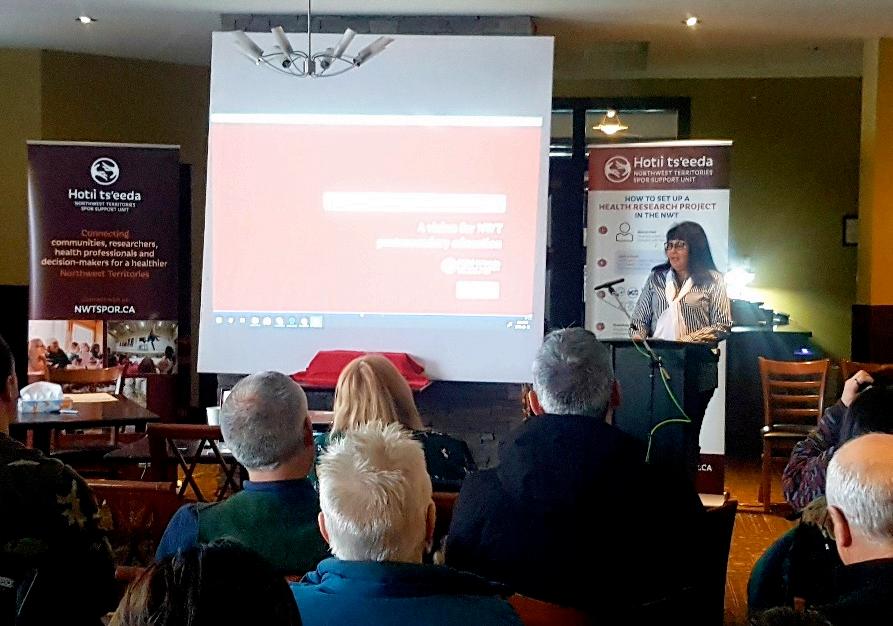
› Scientific Director Stephanie IrlbacherFox, PhD, opened the presentation, joined by Lesa Semmler, BScN, RN and Hotıì ts’eeda Governing Council Member, and Denise McDonald, M.Ed., Gwich’in Health and Education Advocate and Hotıì ts’eeda Health Leaders Program Advisor. They discussed their visions for postsecondary education in the NWT and challenges and opportunities for growth in this area.
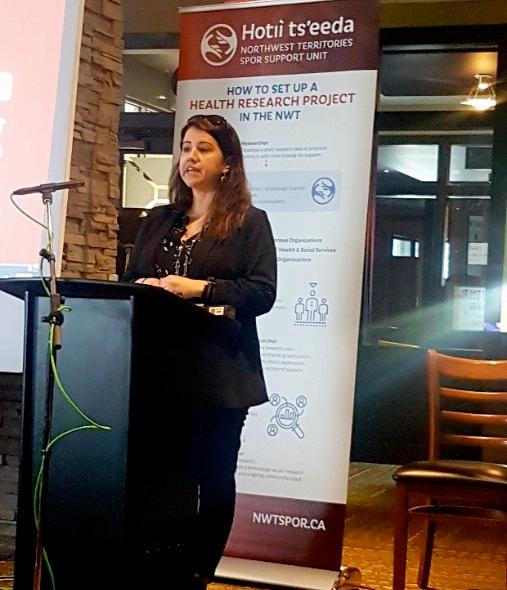
› CBC news article: https://www.cbc.ca/news/ canada/north/beaufort-delta-polytechnicuniversity-northwest-territories-1.5054895
• Yahkeh Naa’ih Health Leaders Program launched
› Yahkeh Naa’ih (Health Leaders) Mentorship Program Development Workshop held February 26, 2019
› In March 2019, Hotıì ts’eeda, in partnership with Gwich’in Tribal Council, launched a new 18-month mentorship program. The Yahkeh Naa’ih Mentorship Program is a unique made-in the-North program to build up Indigenous Youth interested in community health, wellness and research, to be completed while in school or working.
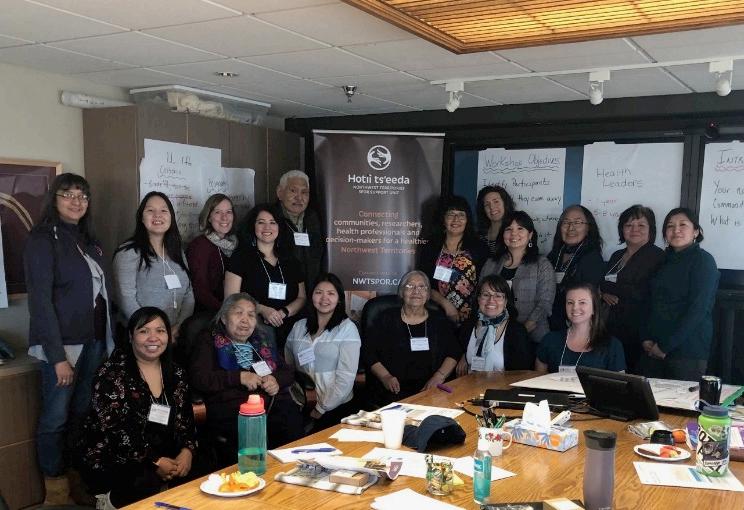
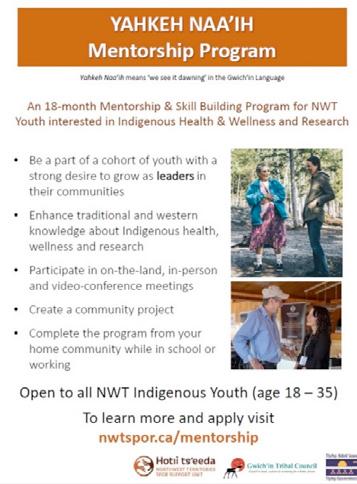
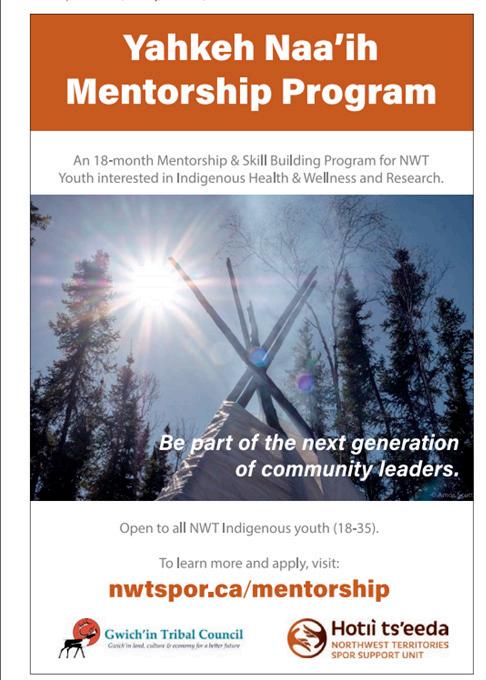
• Cabin Radio print story: https://cabinradio. ca/14160/news/health/mentorship-schemehopes-to-build-nwt-health-leaders/?fbclid=IwA R0Q5FGtQKITrUslhffxnCoOREo4657CColDp fGt9dWZF9u75___nlR6fvw
Meetings Attended:
• Hotıì ts’eeda Governing Council Meeting: The Hotıì ts’eeda Governing Council met on November 23, 2018. The project manager provided an update via briefing note (detailed) and short presentation on program updates since on-boarding.
• Aurora College Practical Nursing Program: Hotıì ts’eeda Project Manager visited the Aurora College Inuvik, Practical Nursing program November 28, 2018 and gave a presentation entitled “Health Research in the NWT: The Role of Hotıì ts’eeda”. Spoke with students about
opportunities in NWT Health Research, how they may become involved in health research as front line health care providers.
• CIHR Best Brains Exchange: Hotıì ts’eeda Project Manager, along with community stakeholders, will attend CIHR Best Brain Exchange in Yellowknife: “Current Best Practices in Chronic Disease Prevention, SelfManagement and Care: How Does this Translate into a Community Based Model?”
• Aurora College: Health Research in Action Day: Hotıì ts’eeda Project Manager visited the Aurora College Yellowknife, BSc Nursing program December 5, 2018 and gave a presentation entitled “Health Research in the NWT: The Role of Hotıì ts’eeda”. Spoke with students about opportunities in NWT Health Research, how they may become involved in health research as front line health care providers.
• NEIHR Development Workshop: Hotıì ts’eeda Project Manager attended the NEIHR Development workshop in Ottawa Ontario. Hotıì ts’eeda attended to create partnerships with potential NEIHR Grant holders and brainstorm how the NWT SPOR Unit could work collaboratively with the future Norther NEIHR Node.
• Arctic Net AGM: Hotıì ts’eeda Project Manager along with Project Director (Julian MacLean, IRC) attended the Arctic Net Annual Scientific Meeting in Ottawa December 10 – 14, 2018. Hotıì ts’eeda had an exhibitor booth, in addition
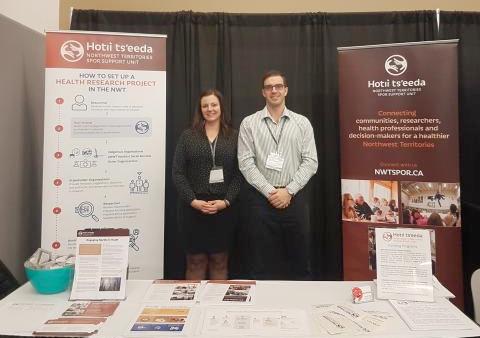
to a poster “Community-driven capacity in health research in the NWT: How Hotıì ts’eeda can help”. Hotıì ts’eeda staff engaged with over 100 students and scientists during the conference.
• Hotıì ts’eeda Staff Meeting: Hotıì ts’eeda all staff meeting. February 12 – 14, 2019. Yellowknife, NT.
• Beaufort Delta Regional Science Fair. March 27, 2019. Inuvik, NT.
Community Visits:
Gwich’in Services Tour: The Health Research Project Manager (Hotıì ts’eeda) participated in open houses and visits to communities in the GSA with the Gwich’in Services Team. The goal of these community visits was to promote awareness of Hotıì ts’eeda within GSA communities and create awareness of what Hotıì ts’eeda does. The PM was unable to attend the Gwich’in services visit to Fort McPherson but did send along promotional information. The following communities were visited this quarter:
Inuvik: September 24, 2018 (Approximately 15 in attendance)
Tsiigehtchic: September 25, 2018 (Approximately 15 in attendance)
Aklavik: October 1 – 3, 2018 (Approximately 17 attendees)
Community Wellness Fairs: Hotıì ts’eeda Project Manager participated in Community Wellness Fairs across the NWT. The goal of these visits is to promote awareness of Hotıì ts’eeda within communities, create awareness of what Hotıì ts’eeda does, and engage with stakeholders at the community level, as well as build connections with other government and non-government health and wellness organizations in the NWT. The following community health fairs were attended this quarter: Fort McPherson: September 26-27, 2018
Colville Lake: October 9 – 10, 2018
Tsiigehtchic: October 17 – 18, 2018
Wrigley: November 6 – 7, 2018
Enterprise: November 14, 2018
Inuvik: February 21, 2019
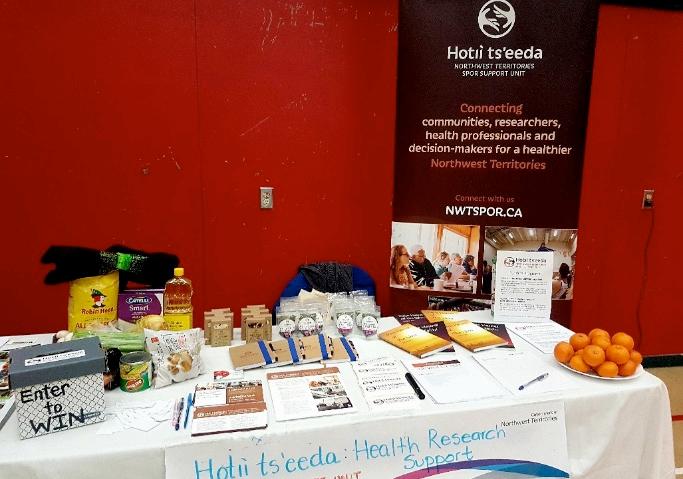
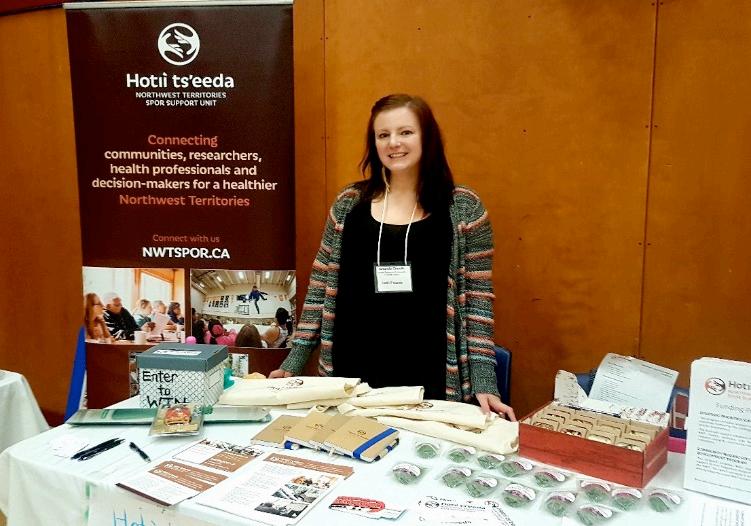
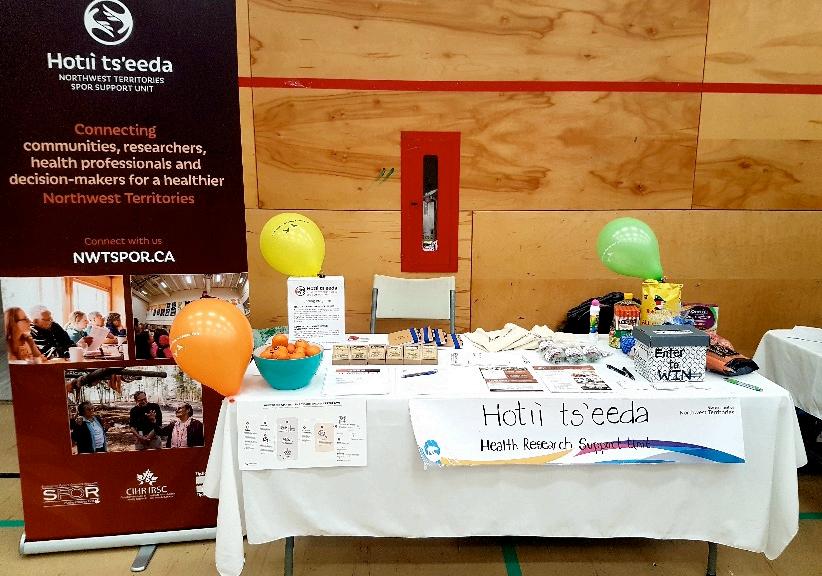
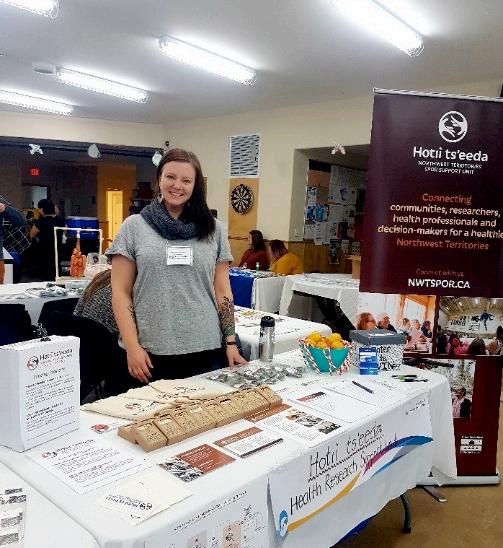
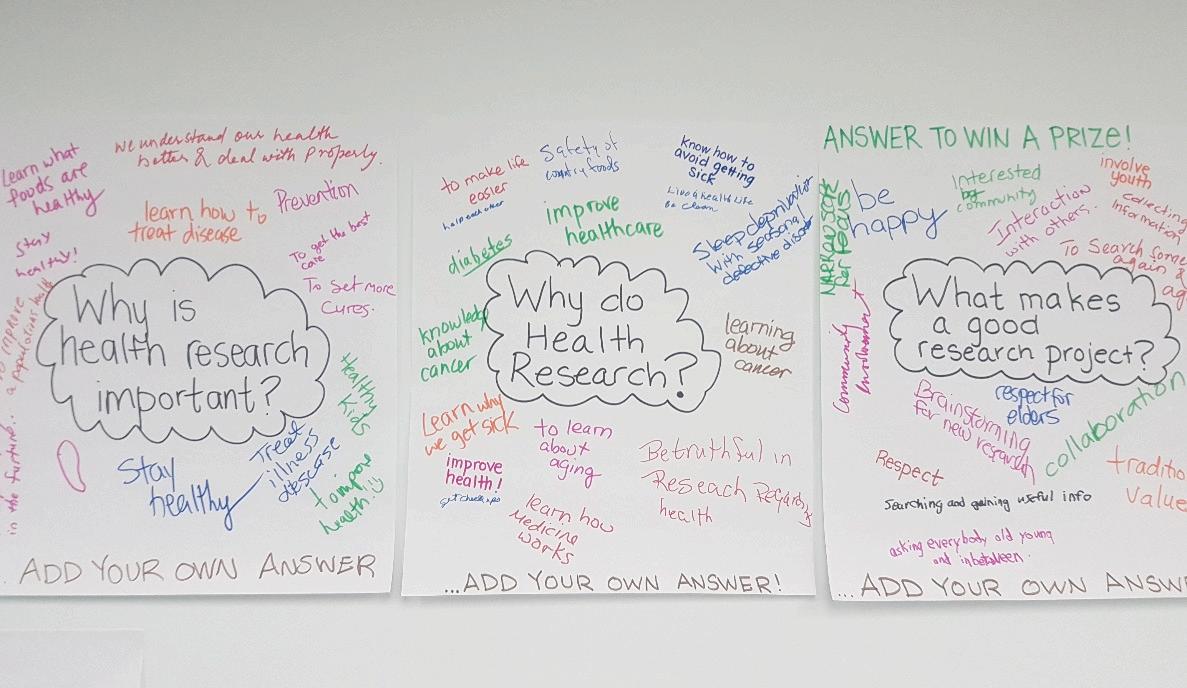
• Capacity and Training Platform: Hotıì ts’eeda is coordinating one Gwich’in and one Inuvialuit Youth to attend the CREATeS Implementation of Suicide Prevention Activities in the Circumpolar Area Workshop in Finland January 30 – February 1, 2019. The Project Manager is coordinating travel and logistics for the Gwich’in youth (Jacey Hagen-Firth).
• Funding Programs: Hotıì ts’eeda funding programs were promoted at Community Healthy Living Fairs and Gwich’in Services Community Visits. Information on funding programs was forwarded to Gwich’in Renewable Resources Board and academic colleges. Three projects approved for funding:
› Inuvik Cancer Support Group led by Agnes Firth and Ruth Wright (Funds administered by Ingamo Hall Friendship Center)
› Shelley Wiart, Athabasca University, project: Digital Storytelling as an Indigenous Women’s Health Advocacy Tool: Empowering Indigenous Women to Frame Their Health Stories
› East 3 East 3 Secondary School for country food workshops with Gwich’in Chef, Chef Francis.
• CIHR Health System Impact Fellowship: Hotıì ts’eeda will work with Gwich’in Tribal Council to apply for a CIHR Health System
Impact Fellowship grant to host PhD Crystal Milligan to complete her PhD research on improving accessibility of health systems in the GSA. Application Deadline: April 2, 2019. Application successful.
• Yahkeh Naa’ih (Health Leaders) Mentorship Program:
› Program Development workshop held February 26, 2019 in Inuvik, NT.
› Workshop brought together 15 stakeholders (elders, knowledge holders, youth, educators, health-care professionals) to introduce the goal of the mentorship program and then discuss ideas on participant selection criteria, desired outcomes, mentor selection criteria and outcomes, specific elements of the program, and a Gwich’in name for the program.
› Smaller focus groups held the first week of March to solicit feed-back from stakeholders unable to attend the February 26, 2019 workshop.
› Yahkeh Naa’ih (Health Leaders) Mentorship Program launched March 20, 2019
› Mentorship program featured on CKLB radio, CBC radio one, and cabin radio in March 2019
› 26 applications received
• Ontario SPOR SUPPORT Unit (OSSU)
• Indigenous Mentorship Network of the Pacific Northwest (IMN-PN)
• Alberta Indigenous Mentorship Network for Health Innovation (AIM-HI)
• Saskatchewan Indigenous Mentorship Network (S-IMP)
• Alberta SPOR SUPPORT Unit (ABSPOR)
• Dene Naowo
• Aurora College (AC)
• Northern Farm Training Institute (NFTI)
• Gwich’in Renewable Resources Board (GRRB)
• Inuvialuit Regional Corporation (IRC)
• Tlicho Government (TG)
Challenges:
Lack of reliable phone and internet service at the Hotıì ts’eeda office was an issue this quarter. This resulted in the project manager missing meetings and deadlines. As a result of the service disruption Hotıì ts’eeda lost money as the project manager was not receiving phone calls about cancelled travel plans (airline tickets and hotel accommodations were not cancelled when a participant had to backout last minute). The phone & internet being out for multiple days at a time has been an on-going issue in the Hotıì ts’eeda / Tai Trigwatsii office.
Miscellaneous (new staff, planned leave, etc.):
• Project Manager last day of work: August 23, 2019
• Summer student last day of work: August 30, 2019
Drin Gwiinzii!,
My name is Ian Matari, I recently joined the Gwich’in Tribal Council at the end of February 2019 in the IT Technician role. I felt right at home from the get go.
I mainly work at the headquarters in Inuvik and I have visited the DGO offices in Aklavik, Fort McPherson, and the Yellowknife office. I felt welcome there as well. I am only yet to visit Tsiighetchic office.
Some of the highlights since I have been here are:
• Facilitating in the Indian Residential School training conference by setting up the sound, translation and presentation devices.
• Helped move and setup IT equipment to the new Yellowknife office location.
• Setup a new printer at Fort McPherson Culture and Heritage Office.
• Took part in Gwich’in day celebration in Aklavik.
I am enjoying my time at GTC so far, I still have things left to learn, and looking forward to continue working with GTC to serve the Gwich’in participants and communities.
Other areas of the IT infrastructure we have worked on this past year include:
Video Conferencing
We have setup video conferencing service to enable employees to collaborate and hold meetings from different locations.
Enrolment / Education
71 ID cards were issued to Gwich’in participants in the past fiscal year.
We created new ID cards for Skills Partnership Fund students. 13 student cards were issued. These cards are also used to get student discount at grocery stores.
In this coming year, we are looking into standardizing forms for Education and Enrolment. And we are looking into establishing online forms for participants to fill and submit online.
Website:
We had 78,000+ visits on our website from April 1st, 2018 to March 31st, 2019.
Here is a breakdown of the top 10 pages on the website with the most visits.
